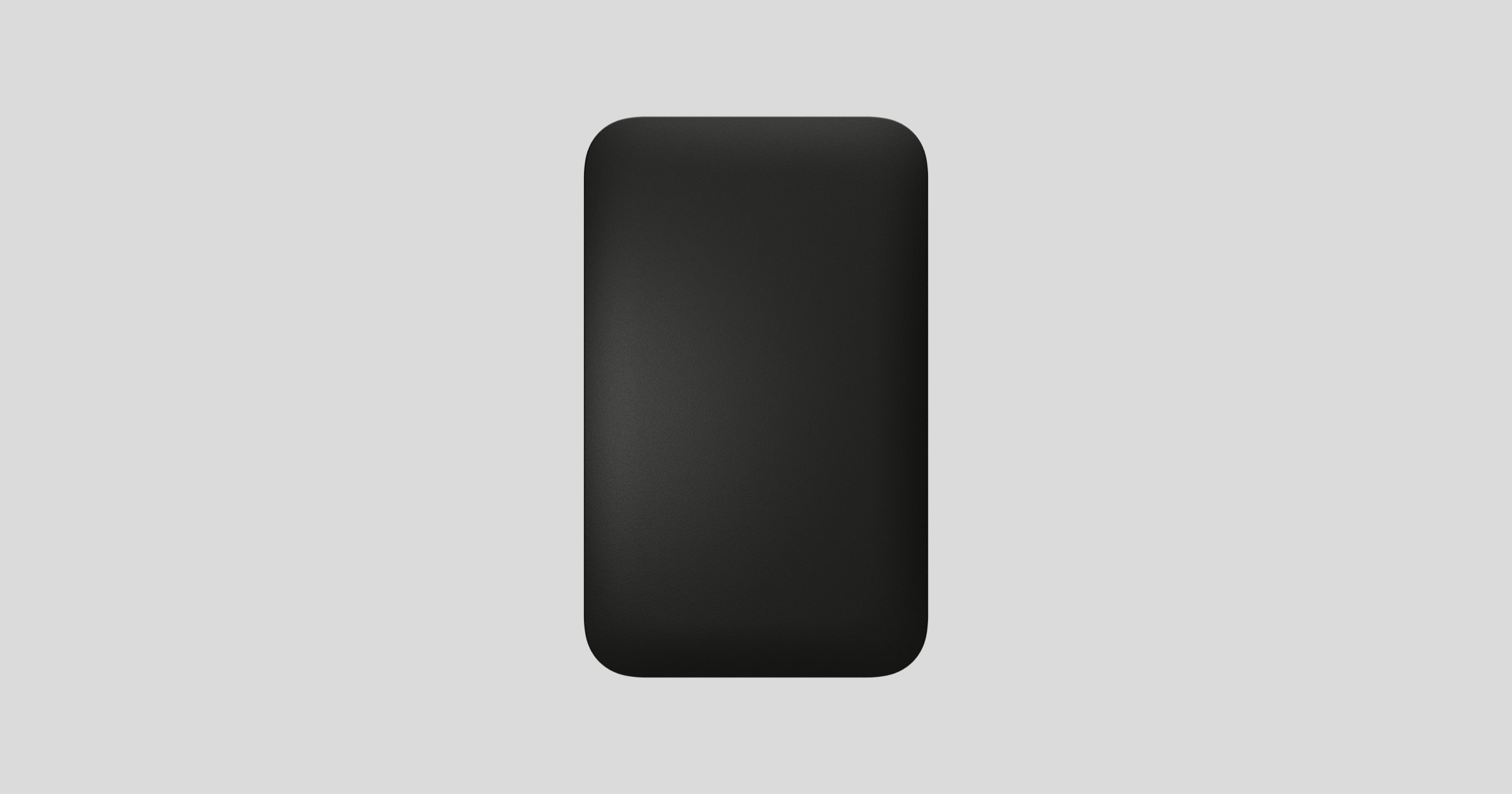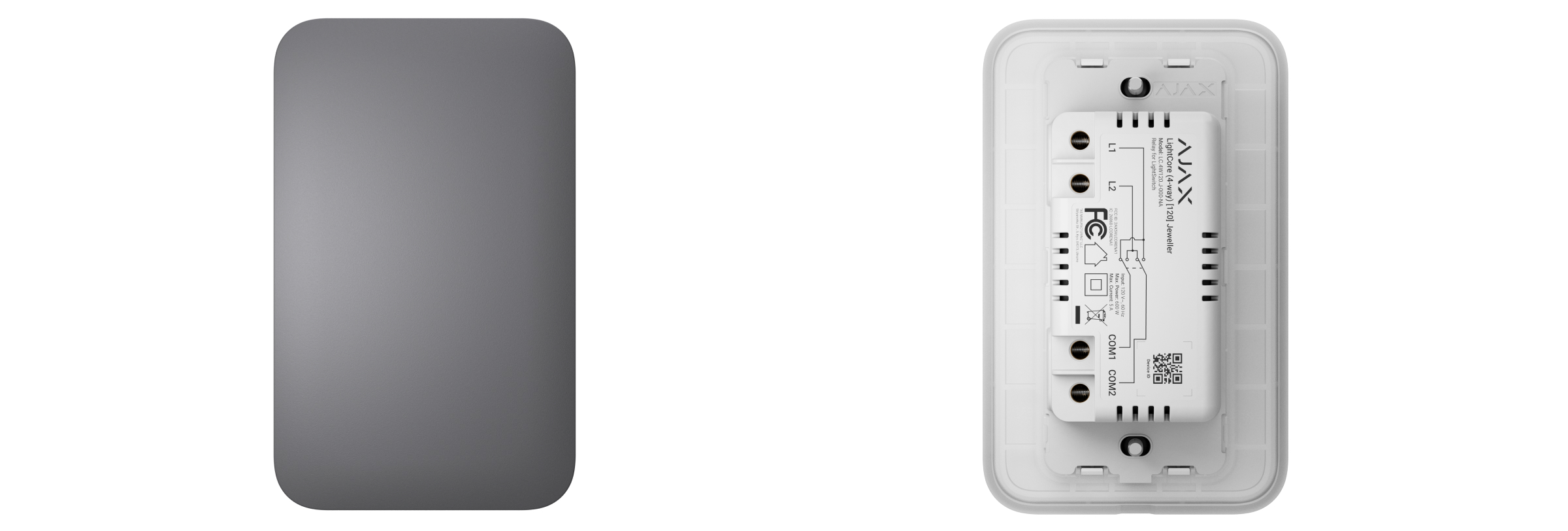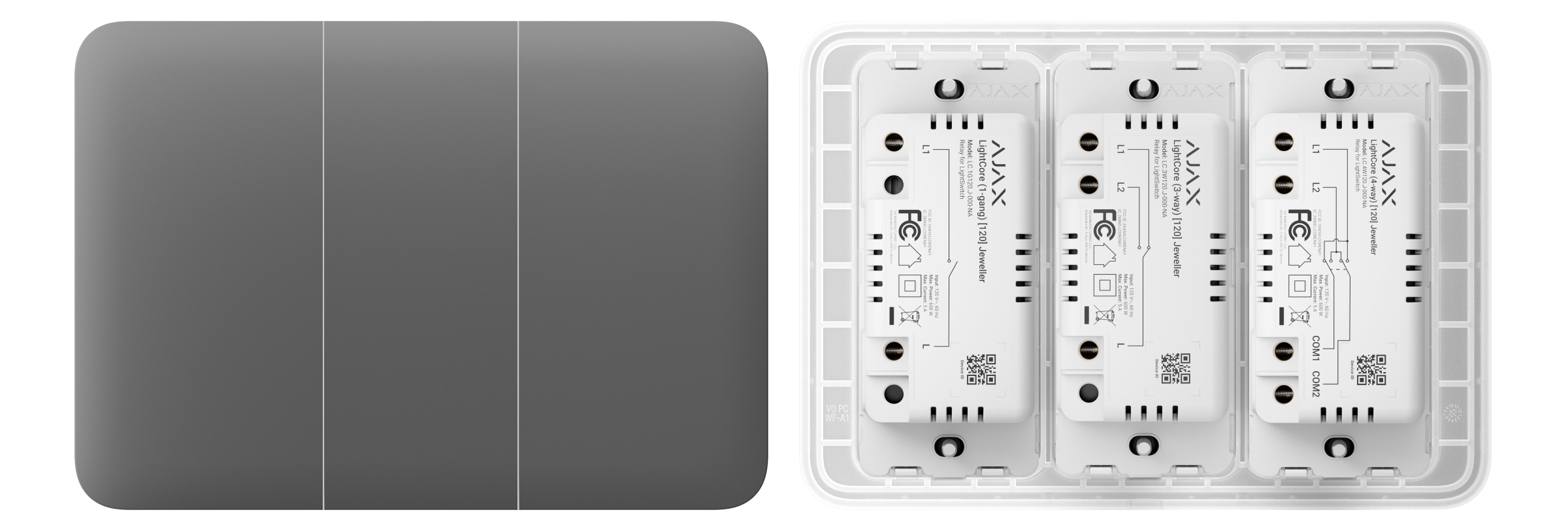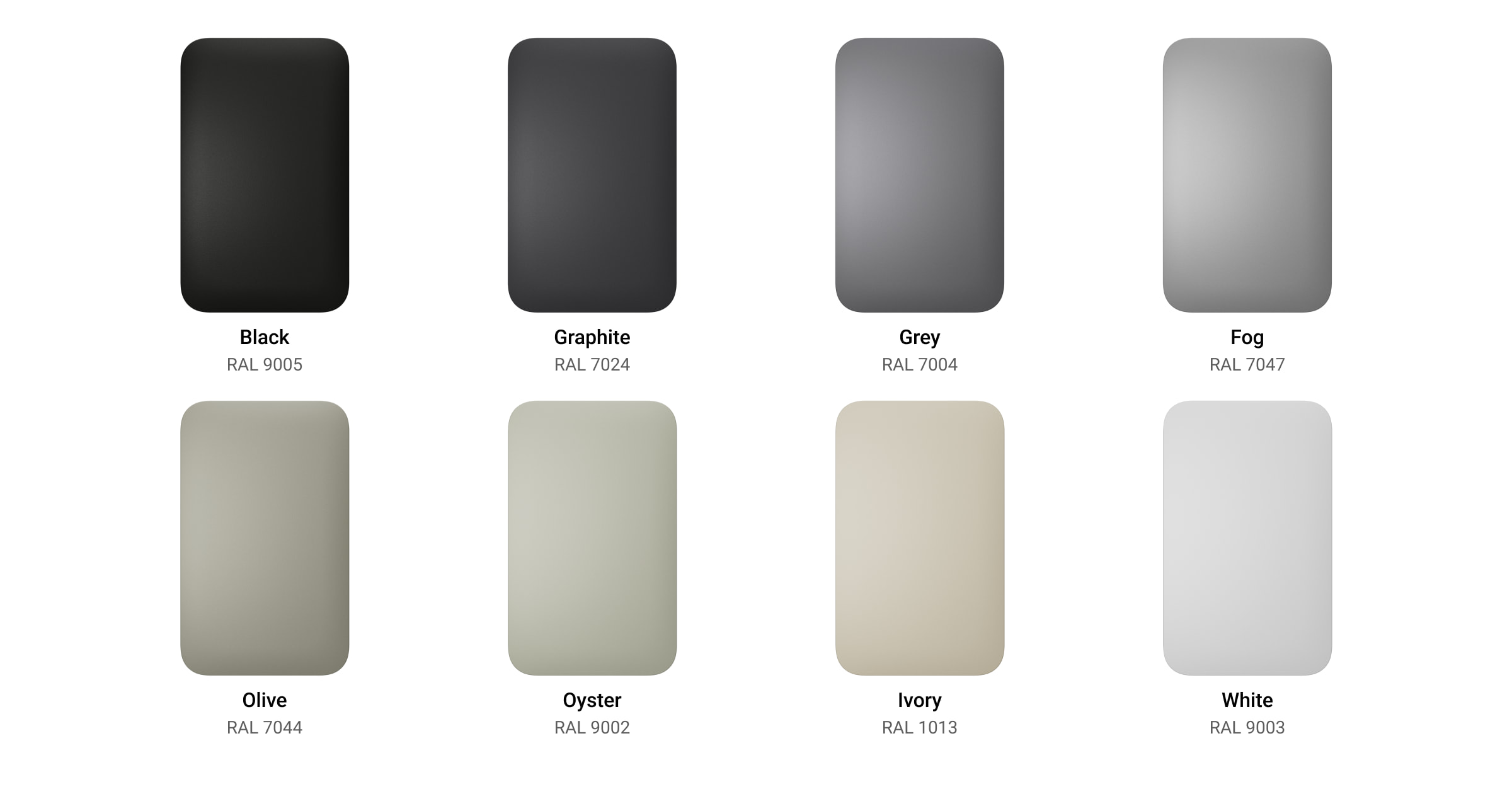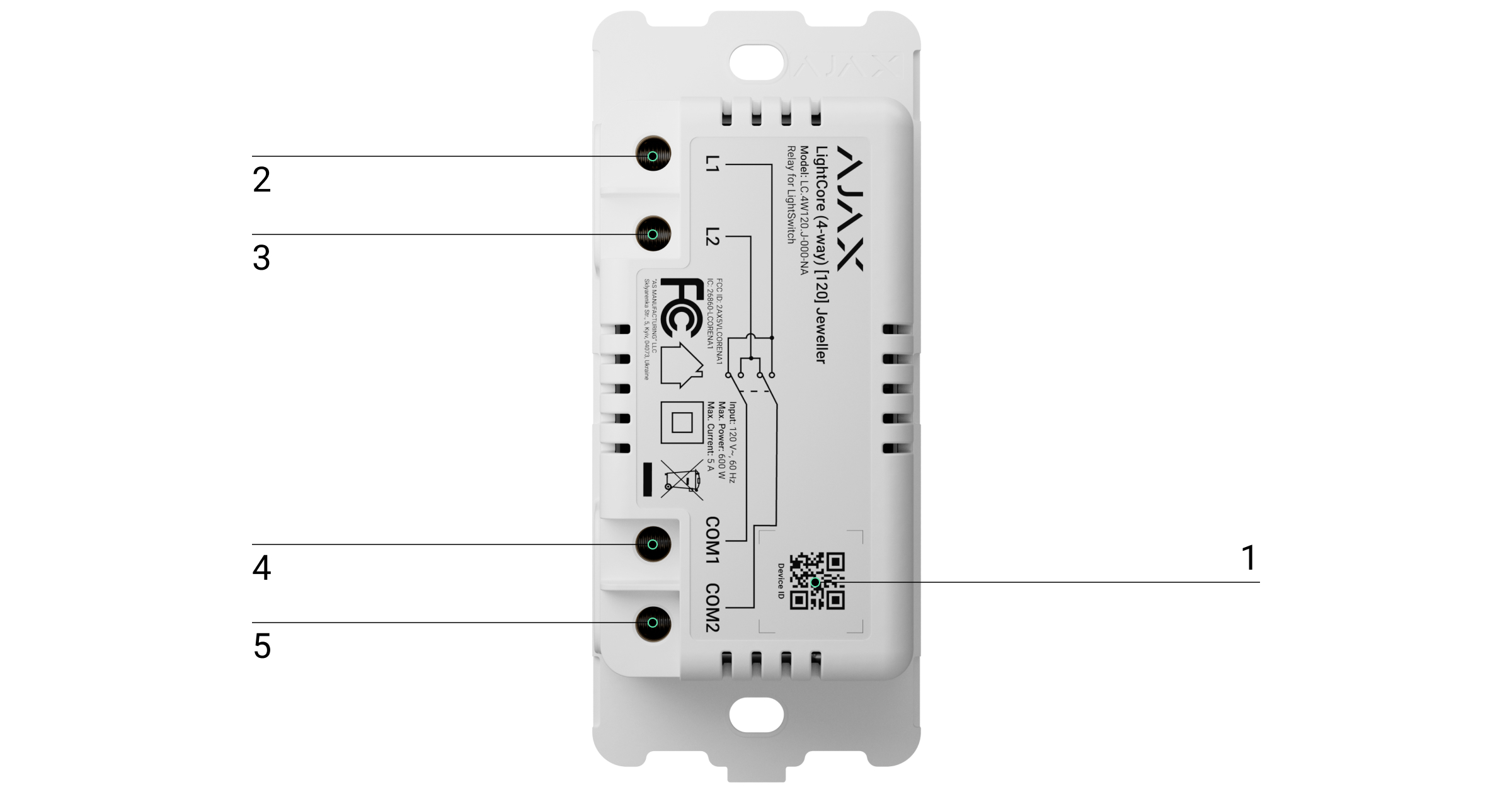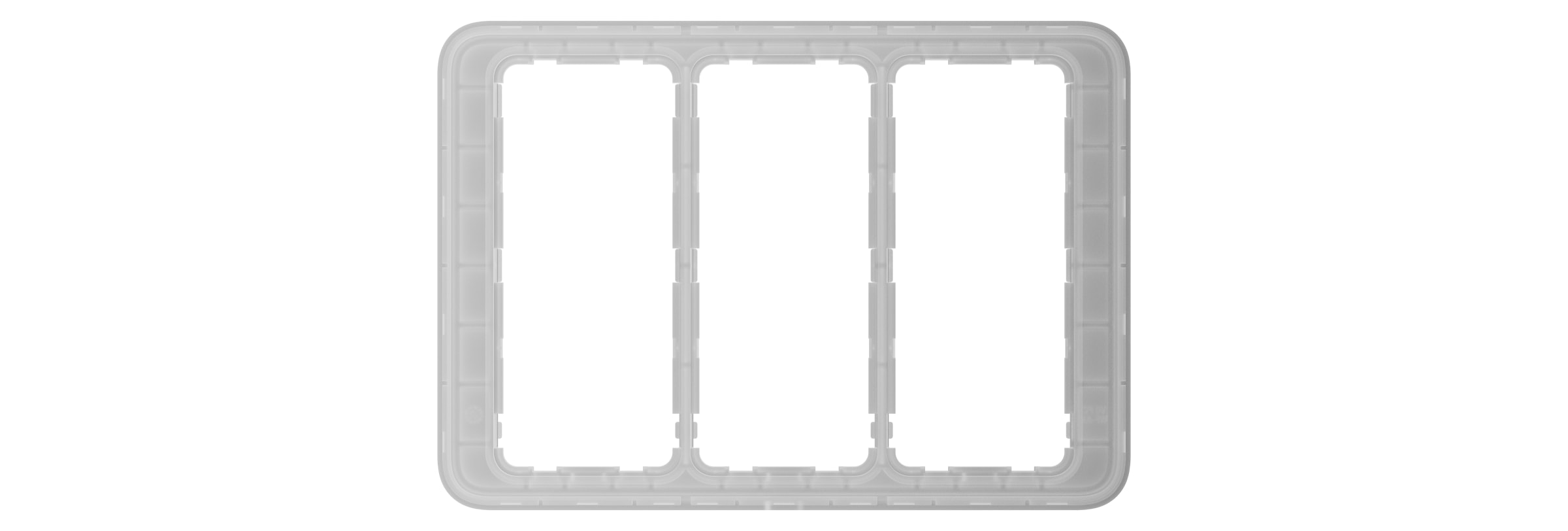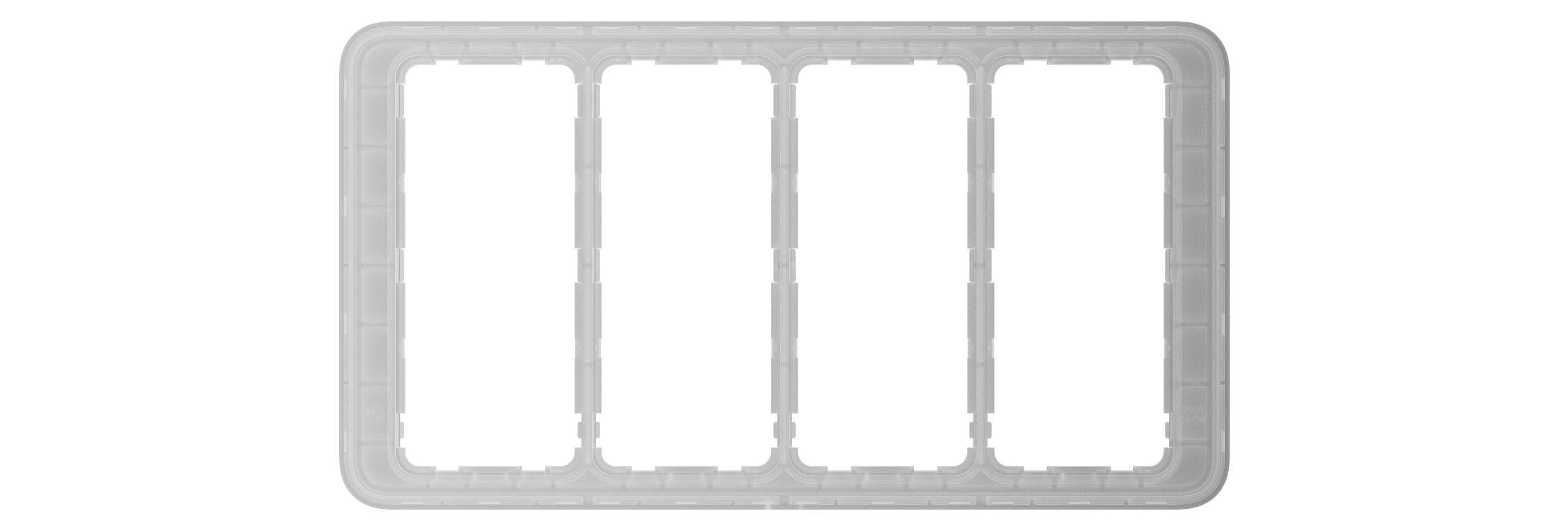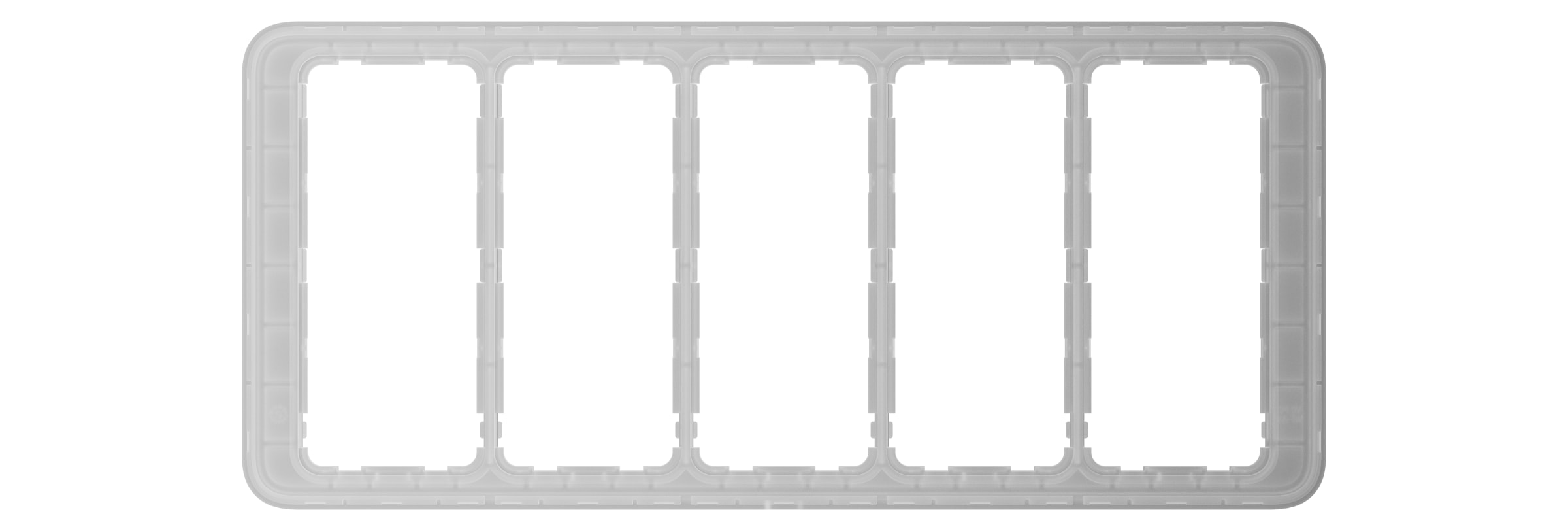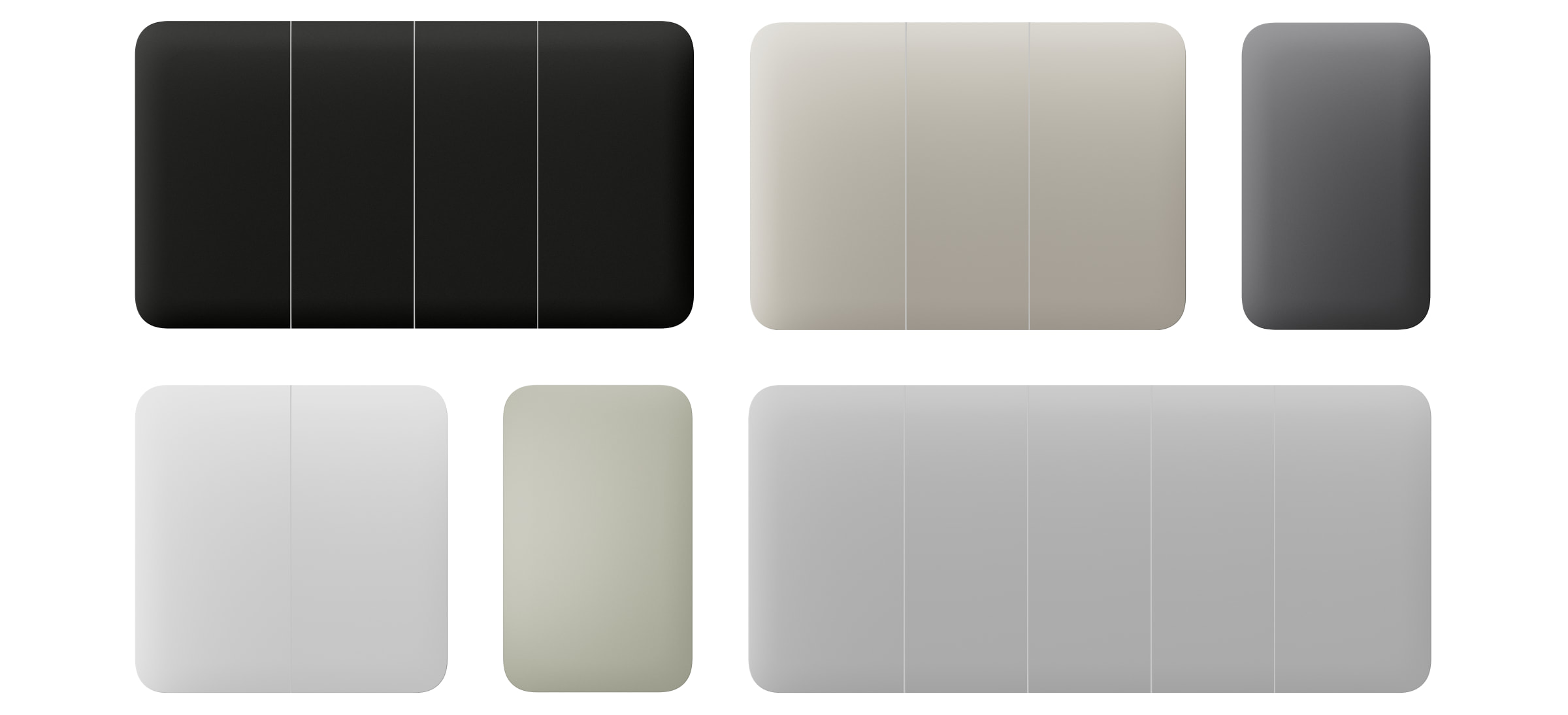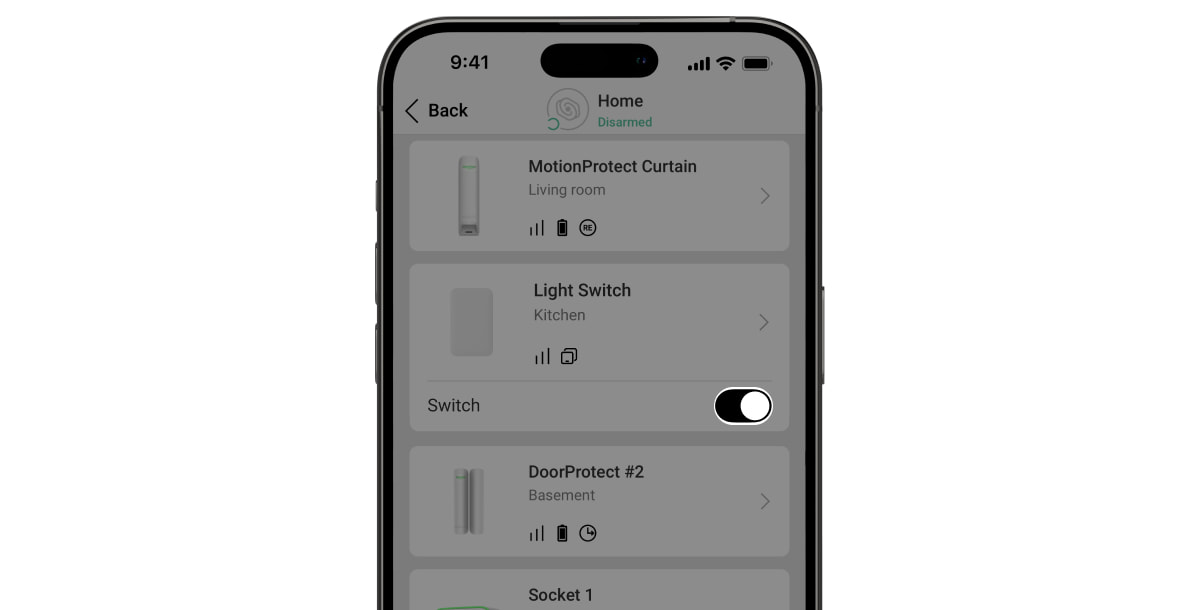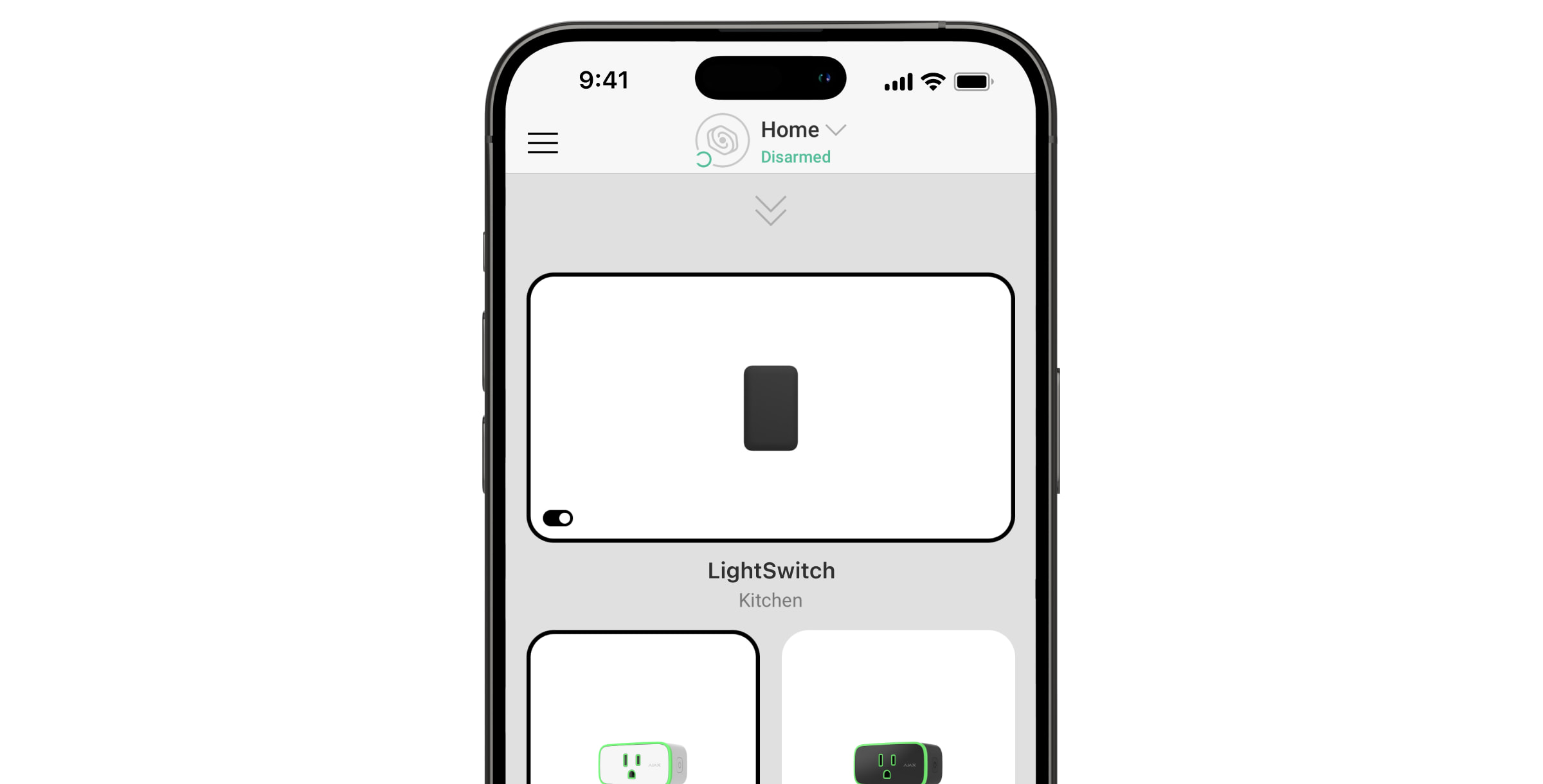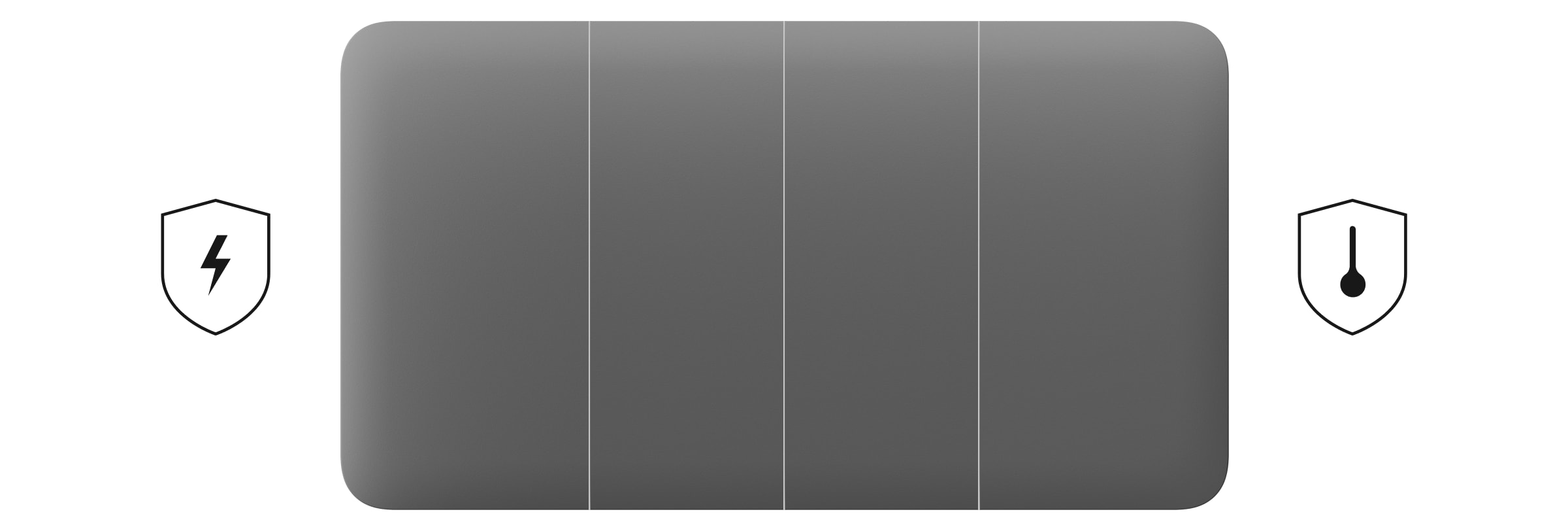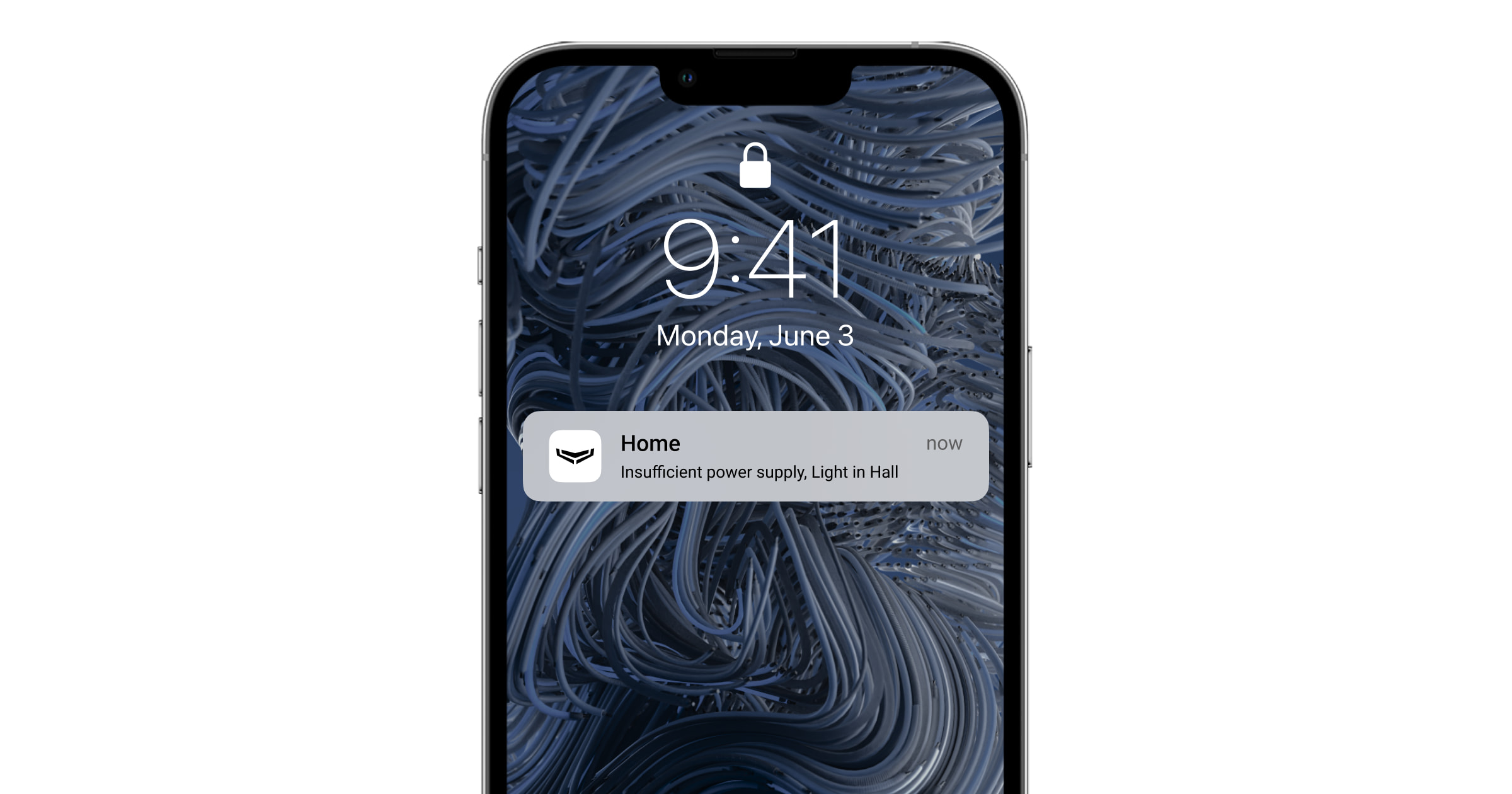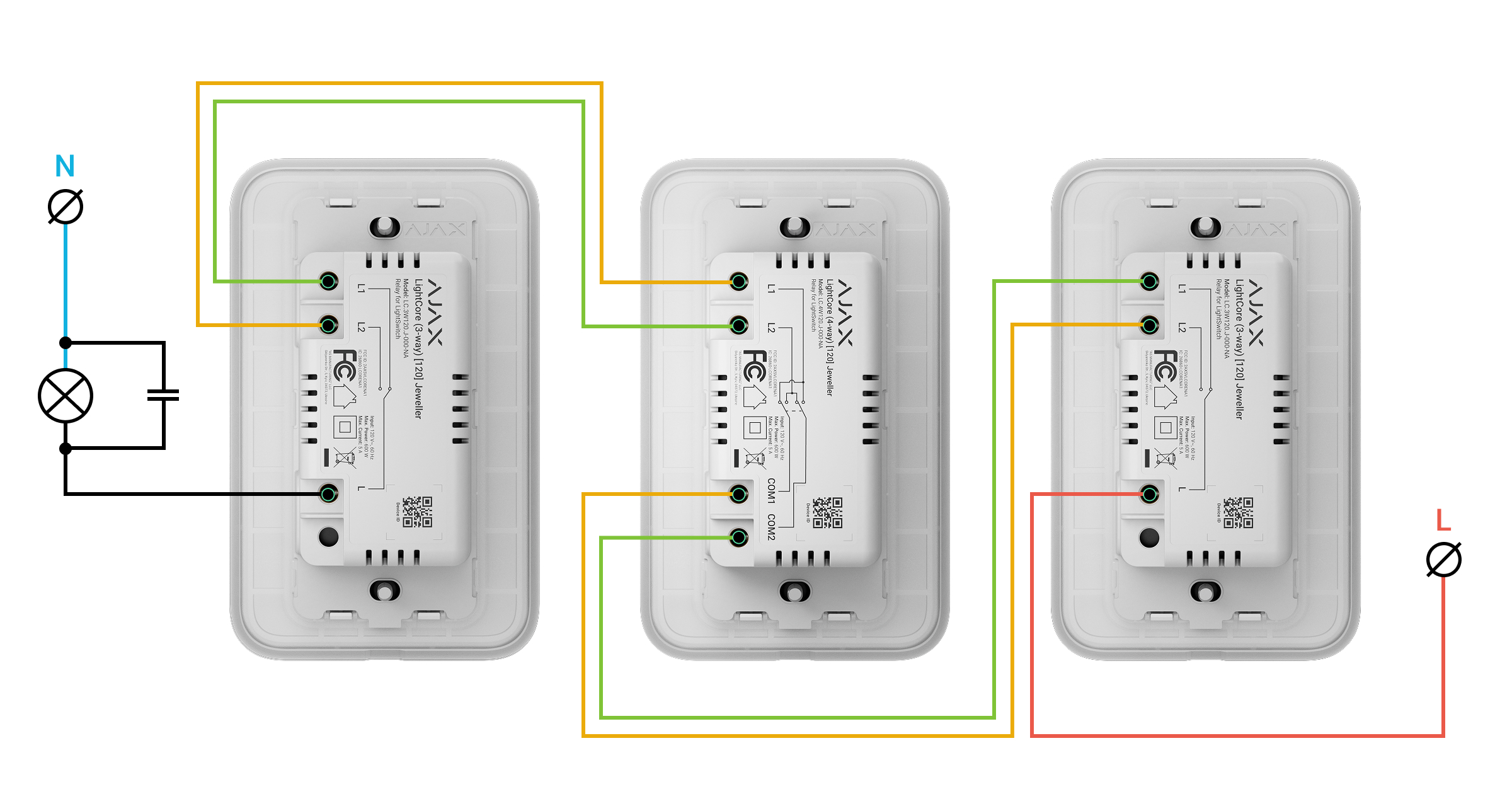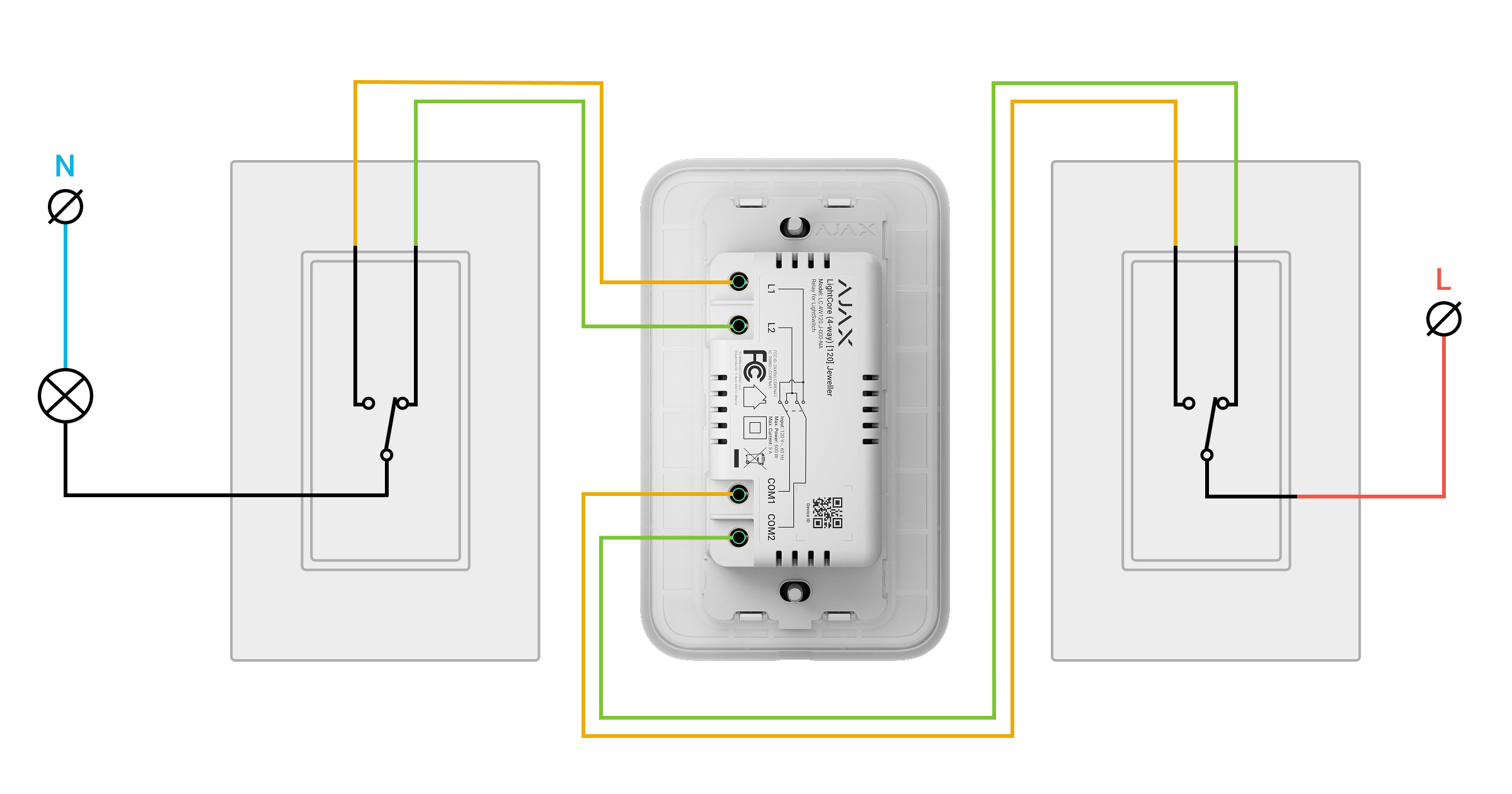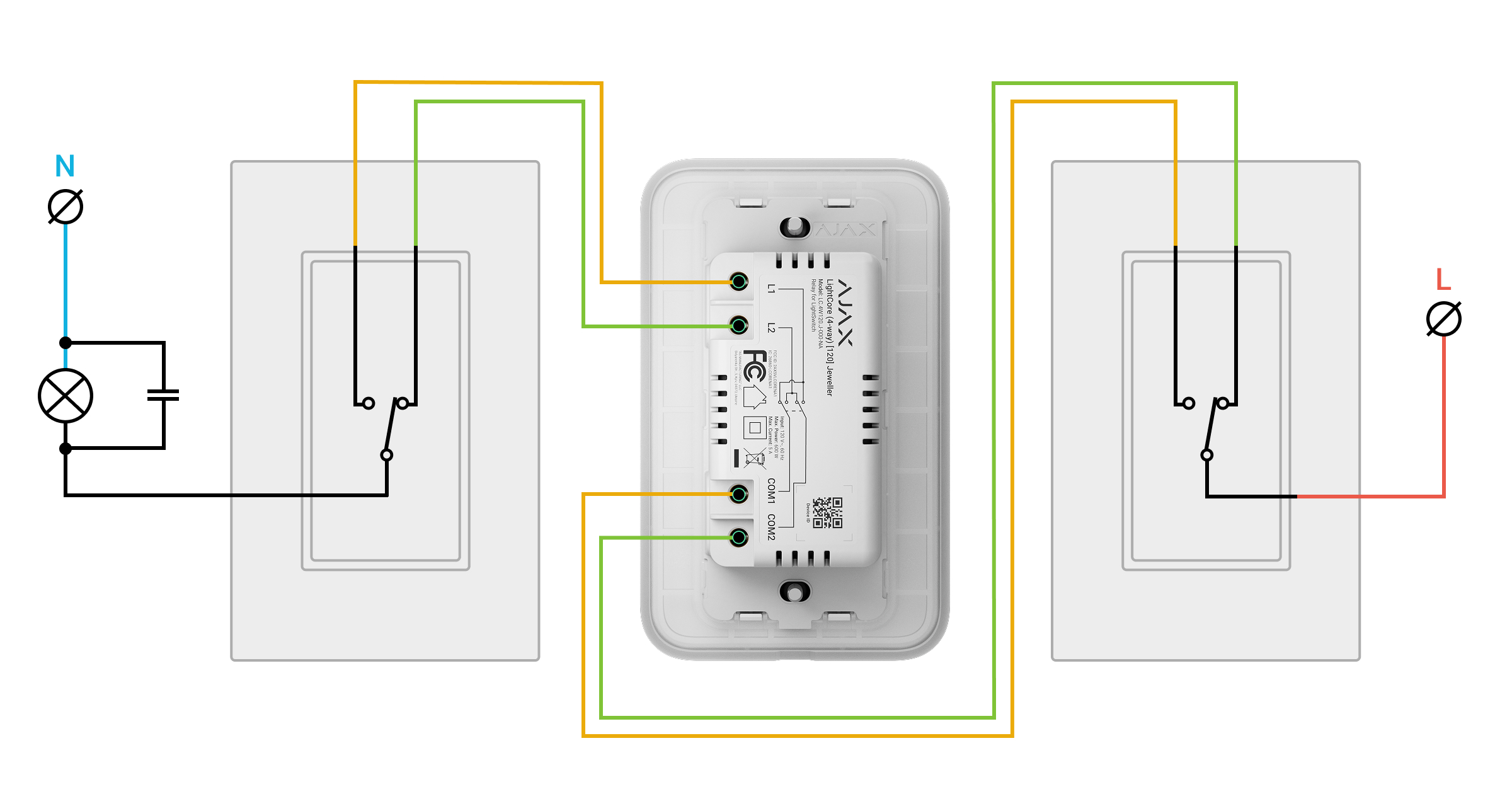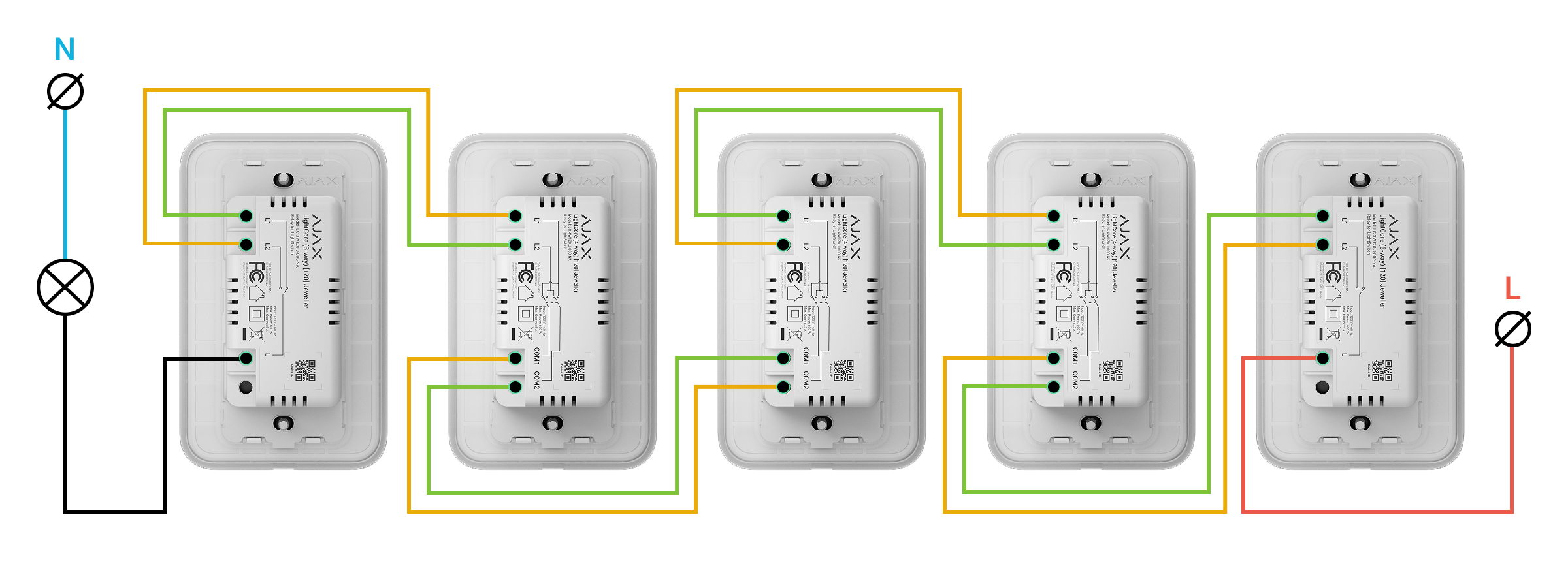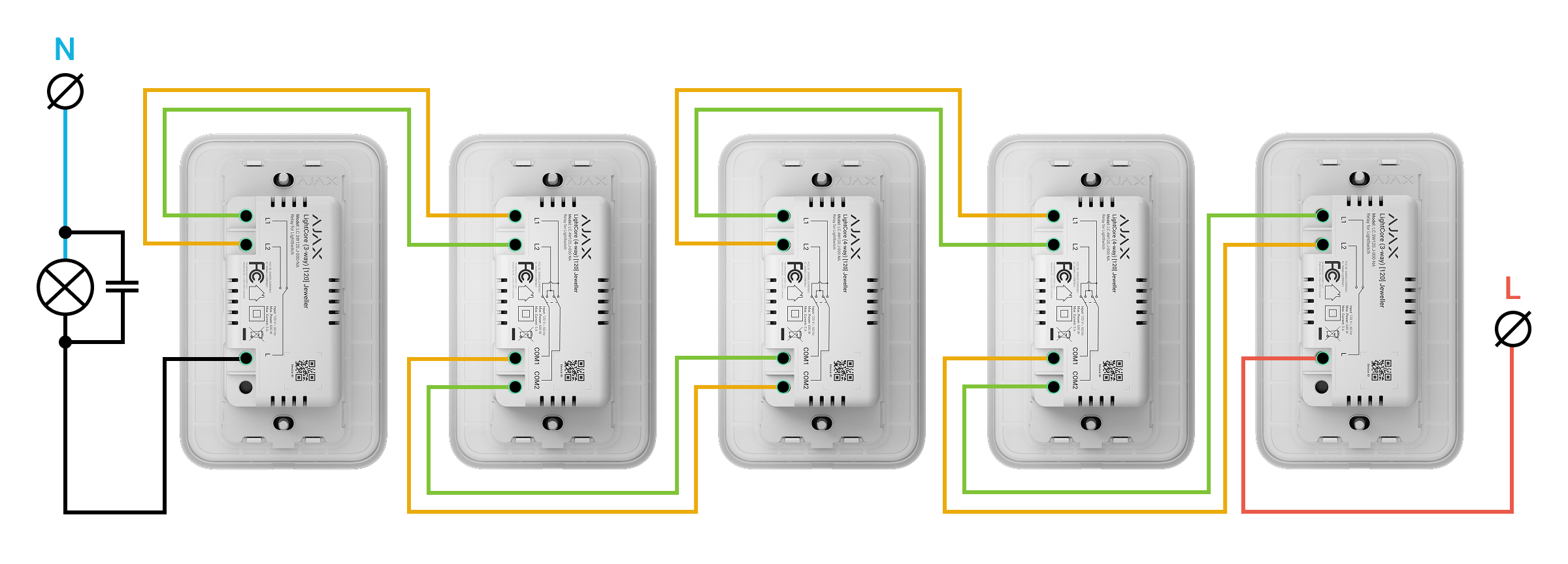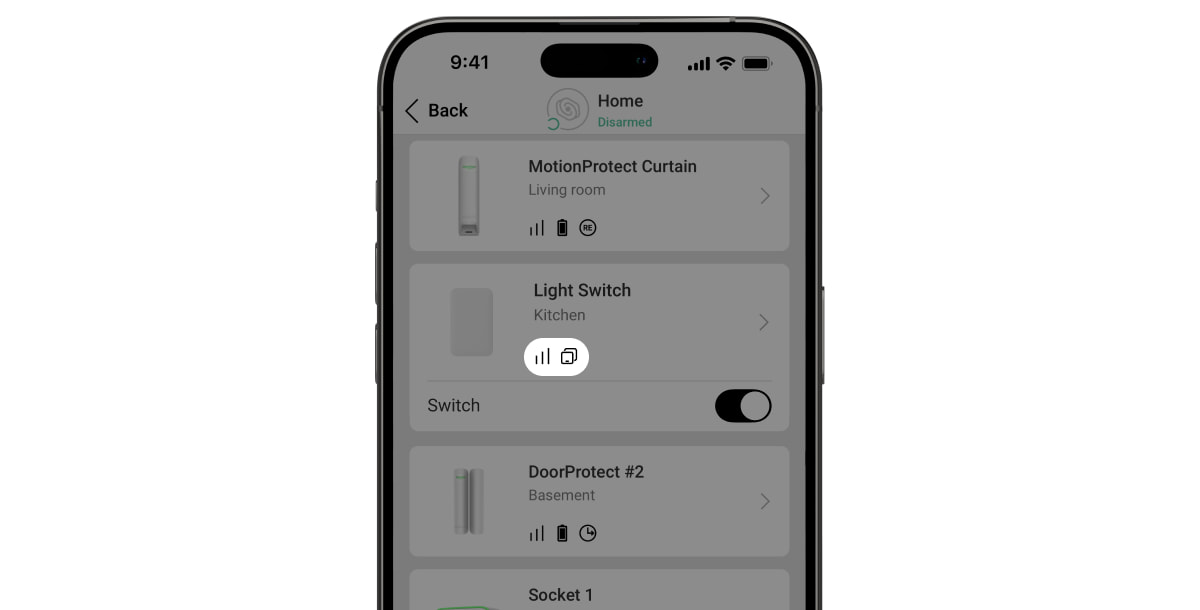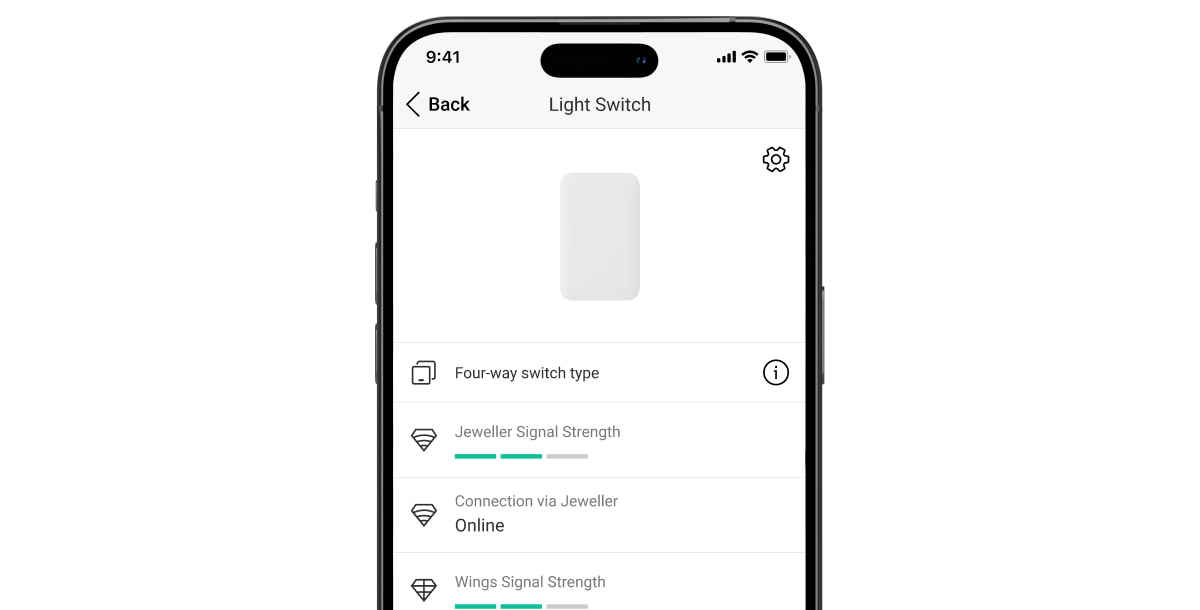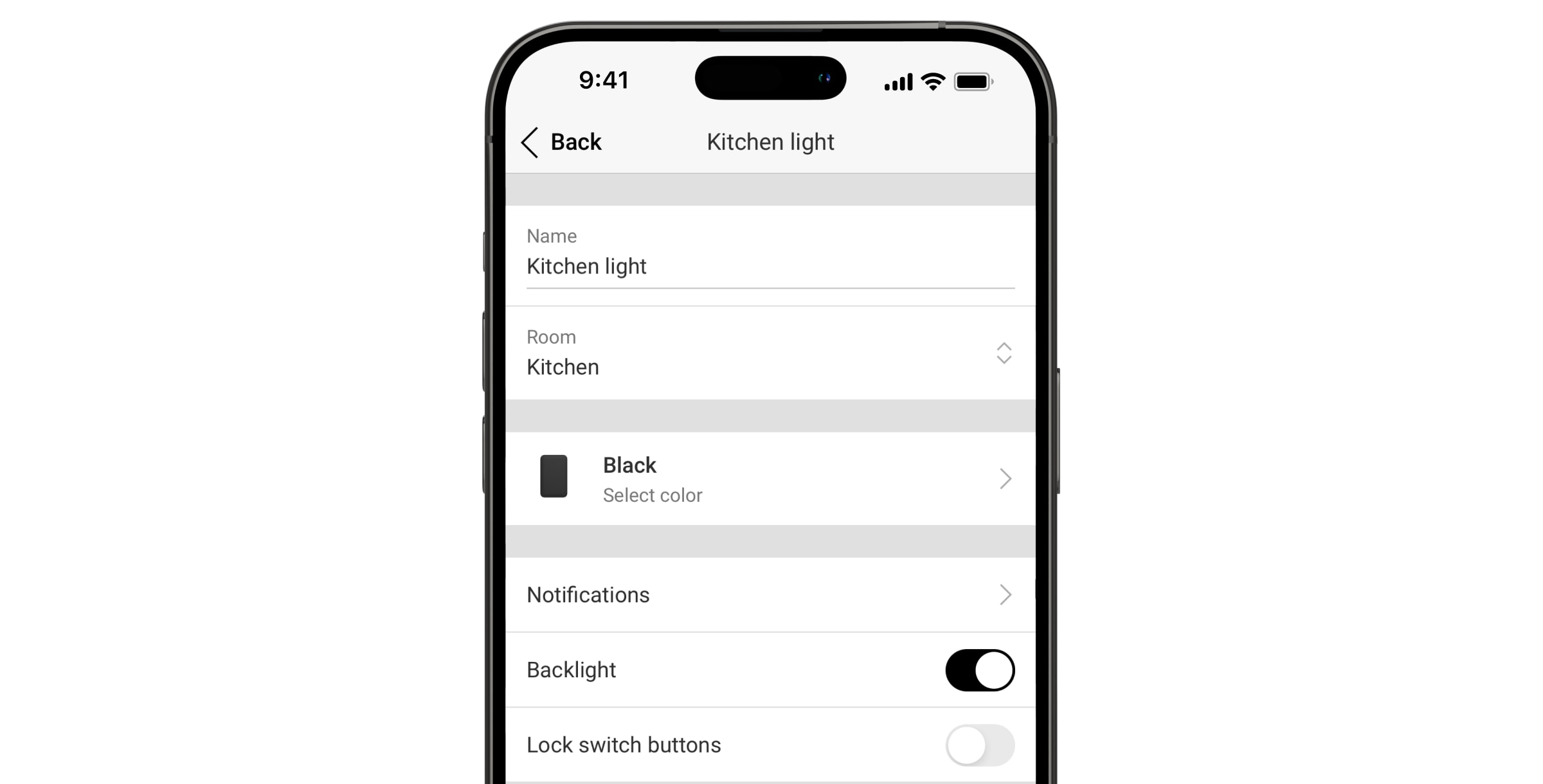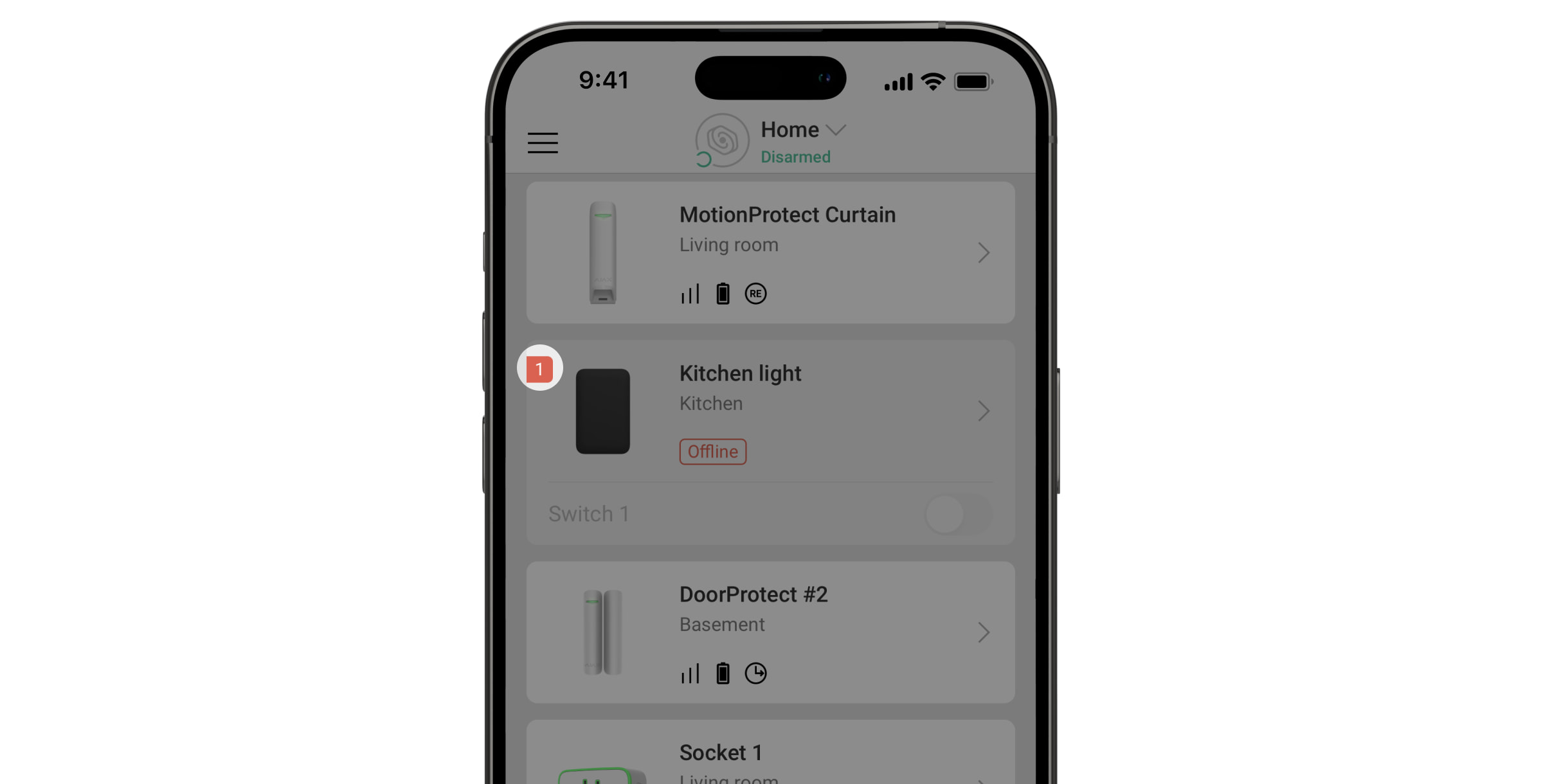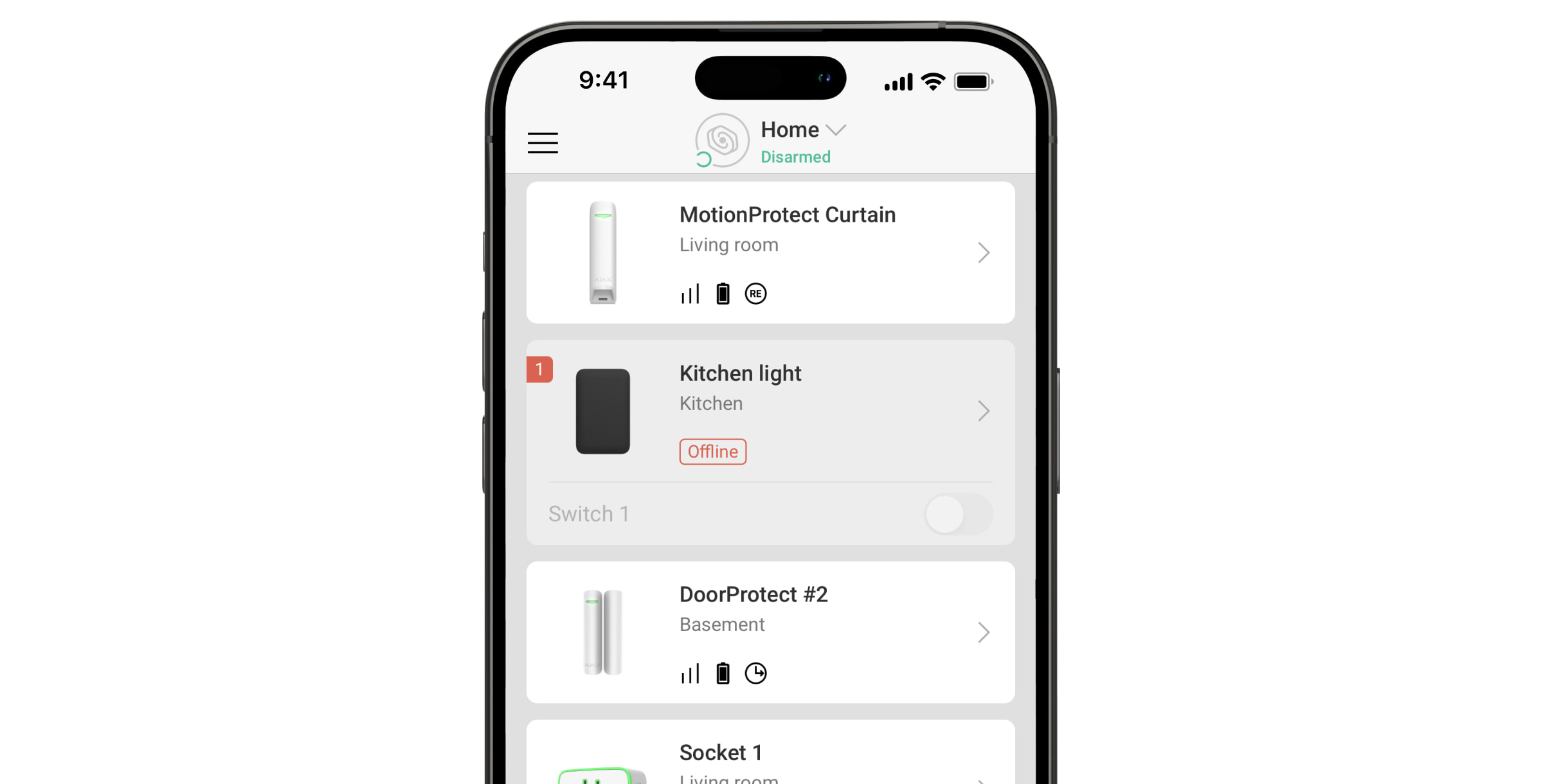LightSwitch [120] Jeweller is a smart touch light switch for indoor installation. It can replace any mechanical or touch switch, with the product line offering regular, 3-way, and 4-way versions. Devices can be combined as a set with other Ajax smart switches and installed into one Frame side by side.
LightSwitch is installed without changing the electrical wiring at the facility. The device does not require a neutral wire, operates only from the line (hot) wire, and features a standard NA form factor (120).
LightSwitch operates as a part of the Ajax system, communicating with the hub using two secure protocols. The light switch uses Jeweller to transmit alarms and events, and Wings to update firmware. The communication range is up to 3,600 feet in an open space.
The list of compatible hubs and range extenders is available here.
Design
LightSwitch is a prefabricated smart light switch. All switch components are purchased separately. Elements are connected mechanically without the need for tools. There are two LightSwitch formats in the Ajax product line: single and combined.
Single switch
A single LightSwitch is a prefabricated device that consists of two components:
- LightCore (4-way) [120] Jeweller — relay for a 4-way switch.
- SoloButton (1-gang) [120] — touch-sensitive panel.
Combined switch
A combined switch consists of several LightCore relays and touch-sensitive panels installed into one Frame with the appropriate number of seats.
- LightCore (4-way) [120] Jeweller — relay for a 4-way switch.
- Frame (2 seats) [120] — frame for two devices.
- Frame (3 seats) [120] — frame for three devices.
- Frame (4 seats) [120] — frame for four devices.
- Frame (5 seats) [120] — frame for five devices.
- CenterButton (1-gang) [120] — central touch-sensitive panel.
- SideButton (1-gang) [120] — side touch-sensitive panel.
Side touch-sensitive panels are installed on the right and left sides of the frame, while central touch-sensitive panels are installed in the center. For example, two side panels and one central panel should be used for three switches in one frame.
Colors
The product line includes 8 colors of touch-sensitive panels: White, Fog, Grey, Graphite, Ivory, Oyster, Olive, and Black.
The RAL colors below are as close as an approximation of the actual color. However, they may slightly differ, so please only use them as a guide to the color choice.
In the switch settings in Ajax apps, the color of LightSwitch can be changed. The color in the app does not have to match the color of the installed panel.
A PRO or a user with admin rights can change the panel color anytime. For example, if the installer has replaced the touch-sensitive panel or a user wishes to set different colors for the switches in the app to distinguish them.
Functional elements
Relay
- Device QR code and ID (serial number) are used to add the switch to the Ajax system.
- The first terminal (L1) for connecting the traveler wire that goes to the first 3-way switch.
- The second terminal (L2) for connecting the traveler wire that goes to the first 3-way switch.
- The first terminal (COM1) for connecting the traveler wire that goes to the second 3-way switch.
- The second terminal (COM2) for connecting the traveler wire that goes to the second 3-way switch.
Touch-sensitive panels
Frames
Frames are available with 2 to 5 seats. These frames are used when installing multiple LightSwitch in a row.
Operating principle
LightSwitch is a smart touch light switch. It can control the lighting in three ways: manually, through smartphone and PC apps, and using automation scenarios.
LightSwitch is installed without changing the electrical wiring at the facility. The device does not require a neutral wire and operates only from the line (hot) wire.
LightSwitch can be used without adding to a hub. In this mode, it operates like a regular touch switch.
LightSwitch (4-way) [120] Jeweller can control lighting appliances with power ranging from 1 to 500 W and with a maximum load current of 4.2 A. To ensure proper operation of LightSwitch with low-power lamps with a wattage of less than 20 W, connect the included capacitor in parallel with the lighting appliance. Refer to the installation section of this manual for details.
The LightSwitch frame has an LED backlight. It is not too bright, so it will not disturb users even if the device is installed near a bed. If necessary, a PRO or a user with admin rights can disable the backlight in Ajax apps.
The product line includes regular, 3-way, and 4-way light switches:
- LightSwitch (1-gang) [120] Jeweller
- LightSwitch (3-way) [120] Jeweller
- LightSwitch (4-way) [120] Jeweller
If necessary, LightSwitch can also control other appliances. For example, one LightSwitch can control lighting, and the other can control a hood or ventilation fan with a power of up to 60 W.
Manual control
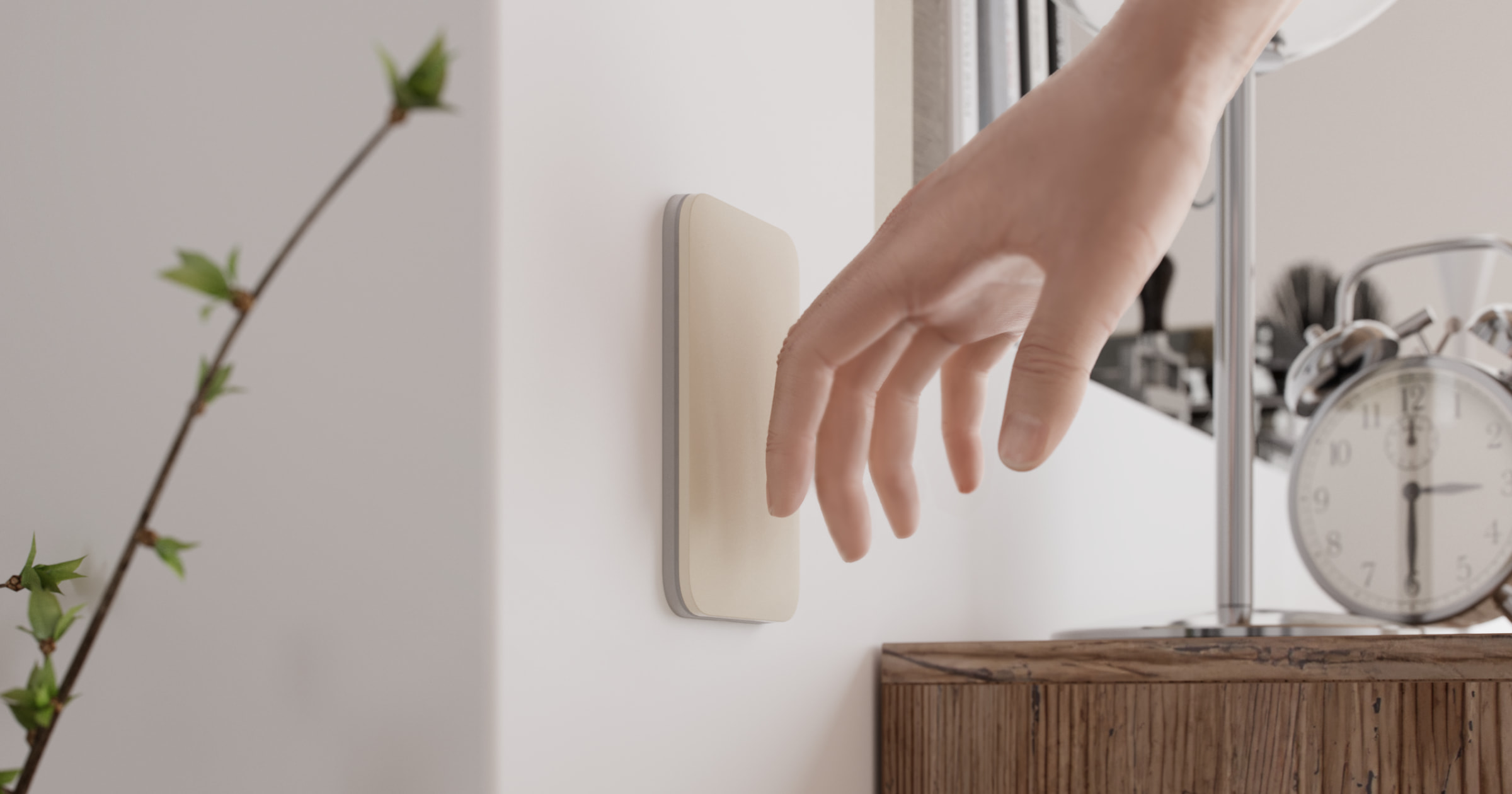
LightSwitch allows users to control the lighting by presenting their hand within a distance of 0.5 inch (15 millimeters) or by touching the touch-sensitive panel. Contactless control is not limited, even if hands are dirty or wet. The sensor reacts under any conditions, allowing the switch to be installed in crowded places, such as restaurants, factories, and offices.
The sensitivity of the touch-sensitive panel can be adjusted in the device settings in the app. Higher sensitivity ensures contactless operation, while lower values might require a slight touch of the button.
The LightSwitch sensor instantly reads the signal and transforms it into an electric pulse. LightCore receives this pulse and activates a relay that switches on/off the lighting appliance or another connected load type, such as a hood or ventilation fan with a power of up to 60 W.
The entire LightSwitch panel is touch-sensitive. Therefore, lighting can be controlled by touching or reaching any part of the touch-sensitive panel with a hand.
Remote control
Control via the app
LightSwitch can be used to control lighting manually and remotely through Ajax apps.
Open the Ajax app and tap on the switch in the LightSwitch field in the Devices menu: the state of the switch contacts will change to the opposite, and the lighting will be switched off/on. This way, system users can, for example, switch on the lights in the room in advance.
Lighting control is also available in the Control menu. To do this, go to the Control
menu and swipe up. All control devices added to the hub will appear in the list. Tap on the switch in the LightSwitch field, and the state of the device contacts will change to the opposite. The lighting will be switched on/off.
Automation scenarios
Scenarios help automate security and reduce the number of routine actions. For example, set the lights to switch on by schedule or when disarming the security system.
LightSwitch supports the following types of scenarios:
- By alarm
- By arming/disarming
- By schedule
- By Button press
- By temperature
- By humidity
- By CO2 concentration
- By touching LightSwitch
Scenarios by humidity and CO2 concentration are available when LifeQuality Jeweller is added to the system.
The system does not allow creating sequences of scenarios when the execution of one scenario activates the following one. It prevents accidental endless looping of such scenarios.
Operation modes
LightSwitch can operate in one of two modes: bistable or Shutoff by timer. The operating mode is set by a PRO or a user with admin rights in the device settings in Ajax apps.
By default, LightSwitch operates in the bistable mode, which means the device switches on/off when controlling the lighting.
In the Shutoff by timer mode, the lighting can be switched on for the required time: from 10 seconds to 2 hours. This mode is useful, for example, if a user needs to switch on the lighting in the corridor for 5 minutes when disarming the security system.
Types of electrical protection of the switch
LightSwitch (4-way) [120] Jeweller has two independent types of protection: current and temperature.
Current protection is provided by the fast-blow 8 A fuse installed inside the device.
Temperature protection triggers if the temperature of the switch exceeds 140 °F (+60 °C). If this protection triggers, LightSwitch turns off the load and sends a notification to Ajax apps. The power supply is restored automatically when the temperature of the switch returns to normal.
Types of supported lamps
LightSwitch is compatible with most types of lamps and lighting appliances. Detailed information on LightSwitch operation with different types of lamps is provided in the table.
| Type of lamp | Compatibility | Supported power | Maximum current | Comments |
LED lamp / LED Corn lamp / LED panel / LED strip, etc.
    |
Yes | up to 250 W | 4.2 A | |
Incandescent
 |
Yes | up to 500 W | 4.2 A | |
Halogen
 |
Yes | up to 500 W | 4.2 A | |
Fluorescent (conventional)
  |
Yes | up to 250 W | 4.2 A | |
Fluorescent (compact)
  |
Not recommended | up to 250 W | 4.2 A | Rare flashing is possible. |
| Smart lamps of any type | No | – | – |
Lamps with built-in brightness and color controllers, relays, radio modules, and microcontrollers. Stable operation can not be guaranteed. |
| Mixed light | No | – | – | Designed for non-home / non-office use. |
| Mercury-vapor | No | – | – | Designed for non-home / non-office use. |
| Metal-halide | No | – | – | Designed for non-home / non-office use. |
| Sodium-vapor | No | – | – | Designed for non-home / non-office use. |
Detection of lighting appliances with insufficient power
LightSwitch continuously checks its power supply parameters. If LightSwitch controls the power of a lighting appliance with insufficient power (e.g., up to 20 W for LED lighting appliances, if a bundled capacitor is not connected), the system will notify users. In this case, it is necessary to replace the lighting appliance with a similar one with higher capacity or to connect a bundled capacitor in parallel with the lighting appliance.
When LightSwitch (4-way) [120] Jeweller is connected to the same or other LightSwitch devices in one electric circuit, it is highly recommended to install a bundled capacitor to ensure stable operation of the LightSwitch and lighting appliance.
Jeweller data transfer protocol

Jeweller and Wings are wireless data transfer protocols that provide two-way fast and reliable communication between the hub and devices. The light switch uses Jeweller to transmit alarms and events, and Wings to update the firmware.
Firmware update
If a new firmware version for LightSwitch is available, the icon appears in Ajax apps in the Devices
tab. You can launch the update in states or via the light switch settings. Follow the on-screen instructions to update the firmware successfully.
Information on firmware updates and new versions is available only for light switches that use the ReX 2 Jeweller radio signal range extender and/or are added to such control panels:
- Hub 2 (2G) Jeweller;
- Hub 2 (4G) Jeweller;
- Hub 2 Plus Jeweller;
- Superior Hub Hybrid (2G);
- Superior Hub Hybrid (4G).
Users will receive information about the new firmware version if the light switch is connected to the hub via ReX Jeweller. However, the update is possible only after adding the light switch directly to the above control panels.
Firmware updates are not available for LightSwitch when operating via Hub Plus Jeweller.
Sending events to the monitoring station
The Ajax system can transmit alarms to both PRO Desktop monitoring app and the central monitoring station (CMS) in the formats of SurGard (Contact ID), SIA DC-09 (SIA-DCS), ADEMCO 685, and other protocols.
Only events of lost connection between the switch and the hub (or range extender) are transmitted to the CMS. No other events are sent to third-party monitoring stations of security or monitoring companies. Use PRO Desktop to receive all switch events on the CMS.
Temperature or current protection triggering events are not sent to PRO Desktop as alarms.
When an alarm is received, the operator at the security company’s CMS knows what happened and precisely where to dispatch a rapid response team. The addressability of Ajax devices allows sending events to PRO Desktop or the CMS, including the device type, its name, security group, and virtual room. Note that the list of transmitted parameters may vary depending on the CMS type and the selected communication protocol for it.
The ID and number of the device can be found in its states in the Ajax app.
Selecting the installation site
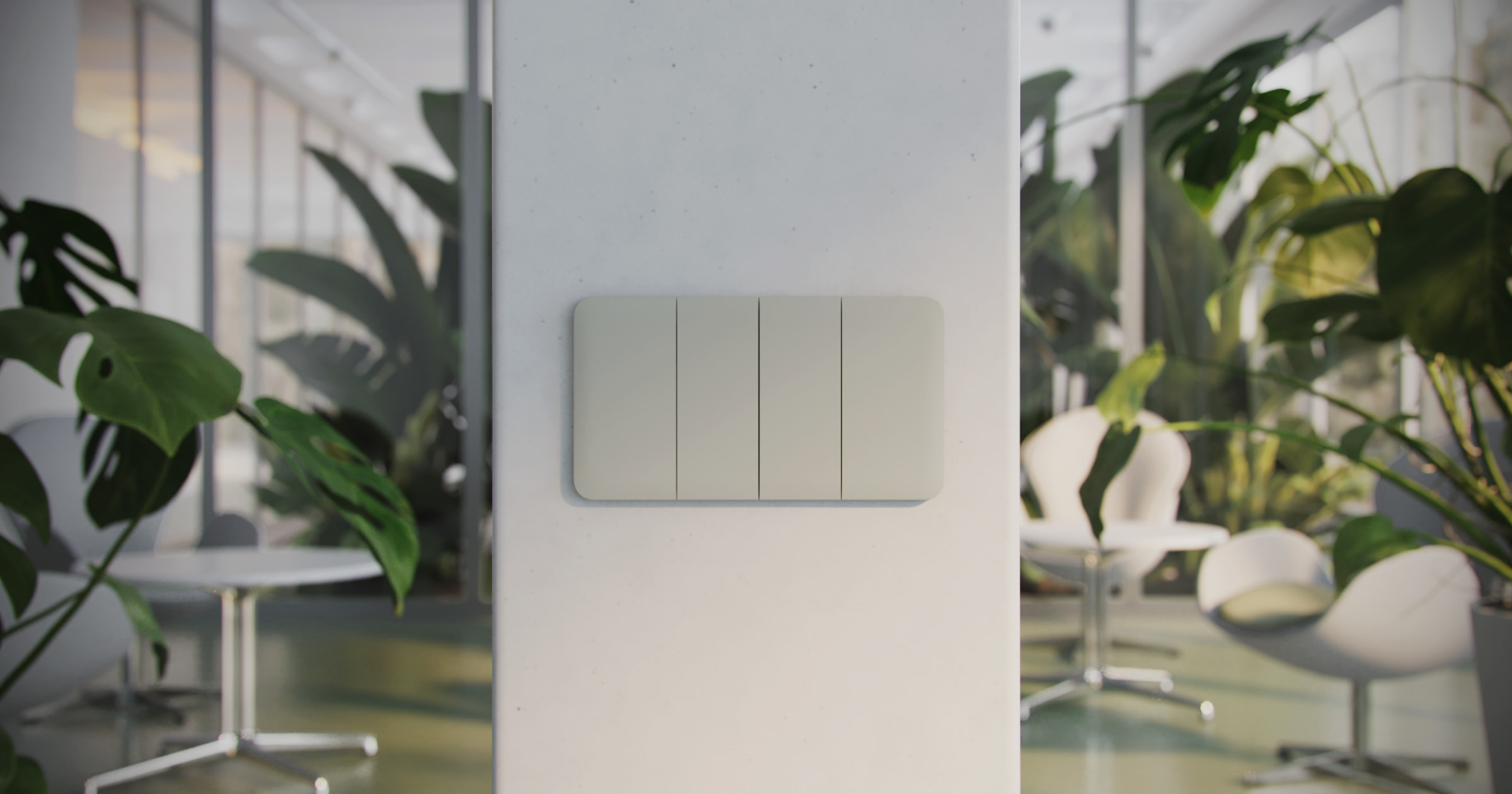
LightSwitch is designed to fit into standard back boxes of the NA form factor (120). The device should be connected to the line (hot) wire for proper operation. Connecting the neutral wire is not required.
Do not connect the neutral wire to the LightSwitch terminals. This can damage the device.
Signal strength
The Jeweller and Wings signal strength is determined by the number of undelivered or corrupted data packages over a certain period of time. The icon on the Devices
tab indicates the signal strength:
- three bars — excellent signal strength;
- two bars — good signal strength;
- one bar — low signal strength, stable operation is not guaranteed;
- crossed out icon — no signal.
Check the Jeweller and Wings signal strength before the final installation. With a signal strength of one or zero bars, we do not guarantee stable operation of the device. Consider relocating the device, as adjusting its position even by 8 in (20 cm) can significantly improve the signal strength. If the signal remains poor or unstable after relocation, consider using ReX Jeweller or ReX 2 Jeweller radio signal range extender.
Do not install the switch
- Outdoors. The device has an IP20 protection class. This may result in device failure or incorrect operation.
- On metal structures. This can lead to incorrect operation of the sensor: it may not respond to touch or give false triggerings.
- In rooms with humidity and temperature that are outside the permissible limits. This may cause a malfunction or incorrect operation of the device. The operating temperature range is from 14 °F to 104 °F (from –10 °C to +40 °C). The permissible humidity is up to 75% without condensation.
- In places with low or unstable signal strength. This may result in a loss of communication between the hub (or range extender) and the switch.
Installation
Only a qualified electrician or installer should install LightSwitch. Do not switch on the power at the switches before installing the touch-sensitive panels. Also, do not try to register the device before installing the touch-sensitive panel, as it contains antennas needed to communicate with the hub.
Before installing the switch, ensure that the optimal location has been selected and that it complies with the requirements of this manual. When installing and operating the device, follow the general electrical safety rules for using electrical appliances and the requirements of electrical safety regulations.
For connection, use cables with a cross-section recommended by the manufacturer of the lighting appliance. LightSwitch (4-way) [120] Jeweller cannot be connected to electric circuits with a load exceeding 500 W. The device does not require a neutral wire and works only from the line (hot) wire.
After installing and connecting the switch, be sure to run the Jeweller Signal Strength Test and Wings Signal Strength Test and check the device’s operation: how it responds to touch, and whether it switches on/off the lights.
The installed touch-sensitive panel can be removed from LightSwitch with a flat screwdriver. To complete this, insert it into the hole from below and turn the screwdriver.
LightSwitch (4-way) [120] Jeweller can control 1 to 500 W lighting appliances. To ensure proper operation of LightSwitch with low-power lamps with a wattage of less than 20 W, connect the included capacitor in parallel with the lighting appliance.
When LightSwitch (4-way) [120] Jeweller is connected to the same or other LightSwitch devices in one electric circuit, it is highly recommended to install a bundled capacitor to ensure stable operation of the LightSwitch and lighting appliance.
The maximum recommended number of LightSwitch devices connected in one electric circuit is 5 devices. To increase the number of LightSwitch devices in one electric circuit, it is required to connect one bundled capacitor in parallel with the lighting appliance per each additional LightSwitch.
One LightSwitch (4-way) [120] Jeweller and two LightSwitch (3-way) [120] Jeweller devices
- De-energize the power cables to which the LightCore relays will be connected.
- Prepare the mounting boxes and remove the pre-installed switches, if any.
- Connect the wires to the LightCore relays according to the diagram below:
- Connect the line (hot) wire to the first LightCore (3-way) [120] relay (L terminal).
- Connect the load wire of the lighting appliance to the second LightCore (3-way) [120] relay (L terminal).
- Connect the LightCore (4-way) [120] relay (COM1 and COM2 terminals) to the first LightCore (3-way) [120] relay (L1 and L2 terminals).
- Connect the LightCore (4-way) [120] relay (L1 and L2 terminals) to the second LightCore (3-way) [120] relay (L1 and L2 terminals).
- Connect the bundled capacitor in parallel with the lighting appliance if:
- its power is less than 20 W (an approximate value that can vary depending on the type and technical characteristics of the lighting appliance);
- it flashes in a turned-off state;
- LightSwitch is malfunctioning or unstable;
- adding LightSwitch to the system fails (with an installed touch-sensitive panel);
- another abnormal operation of LightSwitch or lighting appliance is observed.
Do not connect the neutral wire to the LightSwitch terminals. LightSwitch operates only from the line (hot) wire.
- Install the LightCore relay in the mounting box.
- Secure the LightCore relay with the bundled fasteners.
- Install the remaining LightCore relays if necessary.
- If installing multiple LightSwitch devices, mount the frame with the appropriate number of seats.
- Install the necessary touch-sensitive panels.
- Switch on the power.
- Add switches to the hub using the Ajax app.
LightSwitch (4-way) [120] Jeweller and two third-party 3-way switches
- De-energize the power cables to which the LightCore relay and the third-party switches will be connected.
- Prepare the mounting boxes and remove the pre-installed switches, if any.
- Connect the wires to the LightCore relay and the third-party switches according to the diagram below:
- Connect the line (hot) wire to the first third-party switch according to the manufacturer’s diagram.
- Connect the load wire of the lighting appliance to the second third-party switch according to the manufacturer’s diagram.
- Connect the LightCore (4-way) [120] relay (COM1 and COM2 terminals) to the first third-party switch according to the manufacturer’s diagram.
- Connect the LightCore (4-way) [120] relay (L1 and L2 terminals) to the second third-party switch according to the manufacturer’s diagram.
- Connect the bundled capacitor in parallel with the lighting appliance if:
- its power is less than 20 W (an approximate value that can vary depending on the type and technical characteristics of the lighting appliance);
- it flashes in a turned-off state;
- LightSwitch is malfunctioning or unstable;
- adding LightSwitch to the system fails (with an installed touch-sensitive panel);
- another abnormal operation of LightSwitch or lighting appliance is observed.
Do not connect the neutral wire to the LightSwitch terminals. LightSwitch operates only from the line (hot) wire.
- Install the LightCore relay in the mounting box.
- Secure the LightCore relay with the bundled fasteners.
- Install the remaining LightCore relays if necessary.
- If installing multiple LightSwitch devices, mount the frame with the appropriate number of seats.
- Install the necessary touch-sensitive panels.
- Switch on the power.
- Add switches to the hub using the Ajax app.
Several LightSwitch (4-way) [120] Jeweller and two LightSwitch (3-way) [120] Jeweller devices
The maximum recommended number of LightSwitch devices connected in one electric circuit is 5. To increase the number of LightSwitch devices in one electric circuit, it is required to connect one bundled capacitor in parallel with the lighting appliance per each additional LightSwitch.
- De-energize the power cables to which the LightCore relays will be connected.
- Prepare the mounting boxes and remove the pre-installed switches, if any.
- Connect the wires to the LightCore relays according to the diagram below:
- Connect the line (hot) wire to the first LightCore (3-way) [120] relay (L terminal).
- Connect the load wire of the lighting appliance to the second LightCore (3-way) [120] relay (L terminal).
- Connect the first LightCore (3-way) [120] relay (L1 and L2 terminals) to the first LightCore (4-way) [120] relay (COM1 and COM2 terminals).
- Connect the first LightCore (4-way) [120] relay (L1 and L2 terminals) to the second LightCore (4-way) [120] relay (L1 and L2 terminals).
- Connect the second LightCore (4-way) [120] relay (COM1 and COM2 terminals) to the third LightCore (4-way) [120] relay (COM1 and COM2 terminals).
- Connect the third LightCore (4-way) [120] relay (L1 and L2 terminals) to the second LightCore (3-way) [120] relay (L1 and L2 terminals).
- Connect the bundled capacitor in parallel with the lighting appliance if:
- its power is less than 20 W (an approximate value that can vary depending on the type and technical characteristics of the lighting appliance);
- it flashes in a turned-off state;
- LightSwitch is malfunctioning or unstable;
- adding LightSwitch to the system fails (with an installed touch-sensitive panel);
- another abnormal operation of LightSwitch or lighting appliance is observed.
Do not connect the neutral wire to the LightSwitch terminals. LightSwitch operates only from the line (hot) wire.
- Install the LightCore relay in the mounting box.
- Secure the LightCore relay with the bundled fasteners.
- Install the remaining LightCore relays if necessary.
- If installing multiple LightSwitch devices, mount the frame with the appropriate number of seats.
- Install the necessary touch-sensitive panels.
- Switch on the power.
- Add switches to the hub using the Ajax app.
Adding to the system
Before adding a device
- Install the Ajax app.
- Create an account if you don’t have one.
- Create a space if you don’t have one.
- Add a hub compatible with the switch to the space. Set the required settings and create at least one room.
- Make sure that the hub is on and has internet access via Ethernet, Wi-Fi, and/or mobile network. This can be done in the Ajax app or by looking at the LED indicator of the hub: it should light up white or green.
- Ensure the hub is disarmed and does not start updating by checking its status in the Ajax app.
A PRO or user with admin rights can add LightSwitch to the hub.
Pairing with the hub
Power on the switch and register this device only when the touch-sensitive panel is installed. The panel contains antennas necessary for communication with the hub.
LightSwitch should be within the coverage area of the hub’s radio network to pair with the hub. To work via the radio signal range extender, pair LightSwitch with the hub and then add it to the range extender. This can be done in the range extender settings. Detailed instructions can be found in the manual for the relevant range extender.
The hub and the switch operating at different frequencies are incompatible. The radio frequency range of the device may vary by region. We recommend buying and using Ajax devices in the same region. Please contact Technical Support for information on the operating frequency range.
LightSwitch only works with one hub. When paired with a new hub, the switch stops sending commands to the old one. However, the device is not automatically removed from the device list of the old hub. This must be done manually in the Ajax app.
To add LightSwitch to the hub:
- Install LightSwitch if you haven’t done so before.
- Open the Ajax app and select the required space.
- Go to the Devices
tab and tap Add device.
- Scan the QR code of the device or enter the ID manually. QR code is located on the rear panel of LightCore, the front panel of LightCore, and the device packaging. The device ID can be found below the QR code.
- Enter the name of the device.
- Select a room and a group (if the group mode is enabled).
- Tap Add.
If the maximum number of devices is added to the hub, you will get a notification about exceeding the device limit when you try to add the switch in the Ajax app. The number of devices that can be added to the hub depends on the control panel model and the Jeweller (or Jeweller/Fibra) settings.
- In a few seconds, LightSwitch will appear in the list of hub devices. Updating the device states in the list depends on the Jeweller (or Jeweller/Fibra) settings. The default value is 36 seconds.
If the connection fails, try again in 5 seconds. But this time, during the countdown, press and hold the switch button for at least 3 seconds.
If you press and hold the button of LightSwitch not paired with the hub for at least 3 seconds, the switch flashes green every second for one minute to inform you that it is not paired with the hub.
Functionality testing
After installation, test the operation of the switch: how it responds to touch and whether it switches on/off the light.
The Ajax system provides several tests to select the location of devices correctly. Tests do not start immediately. However, the waiting time does not exceed the duration of one “hub — device” ping interval. The default value is 36 seconds. The device ping interval can be changed in the Jeweller (or Jeweller/Fibra) menu in the hub settings.
The Jeweller Signal Strength Test and Wings Signal Strength Test are available for LightSwitch. The test allows determining the strength and stability of the signal at the installation site.
To run a test in the Ajax app:
- Select the required space.
- Go to the Devices
tab.
- Select LightSwitch from the list.
- Go to Settings
.
- Select a test:
- Run and perform the test using the prompts in the app.
Icons
Icons in the Ajax app display some of LightSwitch states. Icons can be checked in the Devices tab.
| Icon | Meaning |
|
Jeweller signal strength displays the signal strength between the hub and the switch. |
|
| The switch communicates with the hub via a radio signal range extender. | |
|
Temperature protection was activated. |
|
| The device has lost connection with the hub or the hub has lost connection with the Ajax Cloud server. | |
|
The device has not been transferred to the new hub. |
States
The states in the Ajax app provide information about LightSwitch and its operating parameters. To view the states:
- Open the Ajax app.
- Select the required space.
- Go to the Devices
tab.
- Select LightSwitch in the list.
| Parameter | Meaning |
| Data import | Displays the error when transferring data to the new hub:
|
| Malfunction |
Tapping on The field is displayed only if a malfunction is detected. |
| New firmware version available |
Tapping on The field is displayed if a new firmware version is available, and the light switch has been connected to any compatible control panel except Hub Plus Jeweller. |
| Jeweller Signal Strength |
Signal strength between the switch and the hub (or range extender) via the Jeweller channel. Recommended values: 2–3 bars. Jeweller is a protocol for transmitting LightSwitch events and commands. |
| Connection via Jeweller | Connection status between the switch and the hub (or range extender):
|
| Wings signal strength |
Wings signal strength between the device and the hub (or the range extender). The recommended value is 2–3 bars. Wings is a protocol for updating firmware and transmitting the list of the groups, rooms, and other additional information. The field is not displayed if the light switch is connected to Hub Plus Jeweller. |
| Connection via Wings | Connection status on the Wings channel between the hub or the range extender and the device:
The field is not displayed if the light switch is connected to Hub Plus Jeweller. |
| Range extender name | Status of switch connection to the radio signal range extender:
The field is displayed if the switch operates via a radio signal range extender. |
| Button settings | The state of the switch button:
|
| Operating time | The time during which the lighting will be switched on. The field is displayed when the device operates in pulse mode (the Shutoff by timer option is activated). |
| Lock switch buttons | The switch button lock status:
|
| Switch sensitivity | The level of switch sensitivity:
Higher sensitivity ensures contactless operation, while lower values might require slightly touching the switch button. |
| Backlight | The status of the switch frame backlight:
|
| Recover state after power outage | The status of the recovering switch state after a power outage:
Available for LightSwitch (4-way) [120] Jeweller with firmware version 9.60.1.62 or later. |
| Permanent deactivation | The status of the device permanent deactivation setting:
|
| Firmware | Device firmware version. |
| Device ID | LightSwitch ID. Also available on the QR code on the device enclosure and its package box. |
| Device No. | Number of the switch loop (zone). |
Settings
To change the switch settings:
- Open the Ajax app.
- Select the required space.
- Go to the Devices
tab.
- Select LightSwitch in the list.
- Go to Settings
.
- Set the required settings.
- Tap Back to save the new settings.
| Settings | Meaning |
| Name |
The LightSwitch name is displayed in SMS texts and event feed notifications. It can contain up to 12 Cyrillic characters or up to 24 Latin symbols. To change the switch name, tap on the text field. |
| Room |
Virtual room to which LightSwitch is assigned. Its name is displayed in SMS texts and event feed notifications. To change the room, tap on the corresponding field. |
| Select color | Allows changing the color of the switch icon in the app. One of 8 colors can be chosen:
The list of colors corresponds to colors of the touch-sensitive panels. |
| Notifications | Allows configuring switch notifications in the app:
Note that turning on/off and scenario execution notifications are disabled by default. |
| Backlight | Allows configuring the switch frame backlight. Activate this option to switch backlit when the lighting is off. |
| Lock switch buttons | Allows configuring the switch button lock. Activate this option to make the switch unresponsive to touch. Users will be able to control the switch in the app only. |
| Recover state after power outage |
Allows configuring the recovering switch state after a power outage. When enabled, the switch returns to the same state (turned on or off) as before the power outage once the power is restored. Available for LightSwitch (4-way) [120] Jeweller with firmware version 9.60.1.62 or later. |
| Switch sensitivity | Allows adjusting the switch sensitivity:
Higher sensitivity ensures contactless operation, while lower values might require slightly touching the switch button. |
| Button name | To change the name, tap on the text field. |
| Shutoff by timer | Allows deactivating the switch after a set time. If this option is enabled, you need to set an Operating time: from 10 seconds to 2 hours. |
| Operating time | Sets the time during which the lighting will be switched on. The field is displayed when the device operates in pulse mode (the Shutoff by timer option is enabled). |
| Scenarios |
Opens the menu for creating and configuring automation scenarios. Use scenarios to automate security, for routine activities, and to improve comfort. For example, to switch on the lighting according to the schedule or switch it off when the system is armed. |
| Firmware update |
Switches the device to the firmware update mode if a new version is available. The field is not displayed if the light switch is connected to Hub Plus Jeweller. |
| Jeweller signal strength test |
Starts testing the Jeweller signal strength between the switch and the hub (or range extender). The test allows checking the Jeweller signal strength and the stability of the connection between the switch and the hub (or range extender) to select the optimal installation site. |
| Wings signal strength test |
Switches the device to the Wings signal strength test mode. |
| User guide | Opens the switch user manual in the Ajax app. |
| Permanent deactivation |
Allows deactivating the device without removing it from the system. Two options are available:
LightSwitch will retain its state at the time of deactivation: on/off. |
| Delete device | Disconnects the device from the hub and deletes its settings. |
LED indication
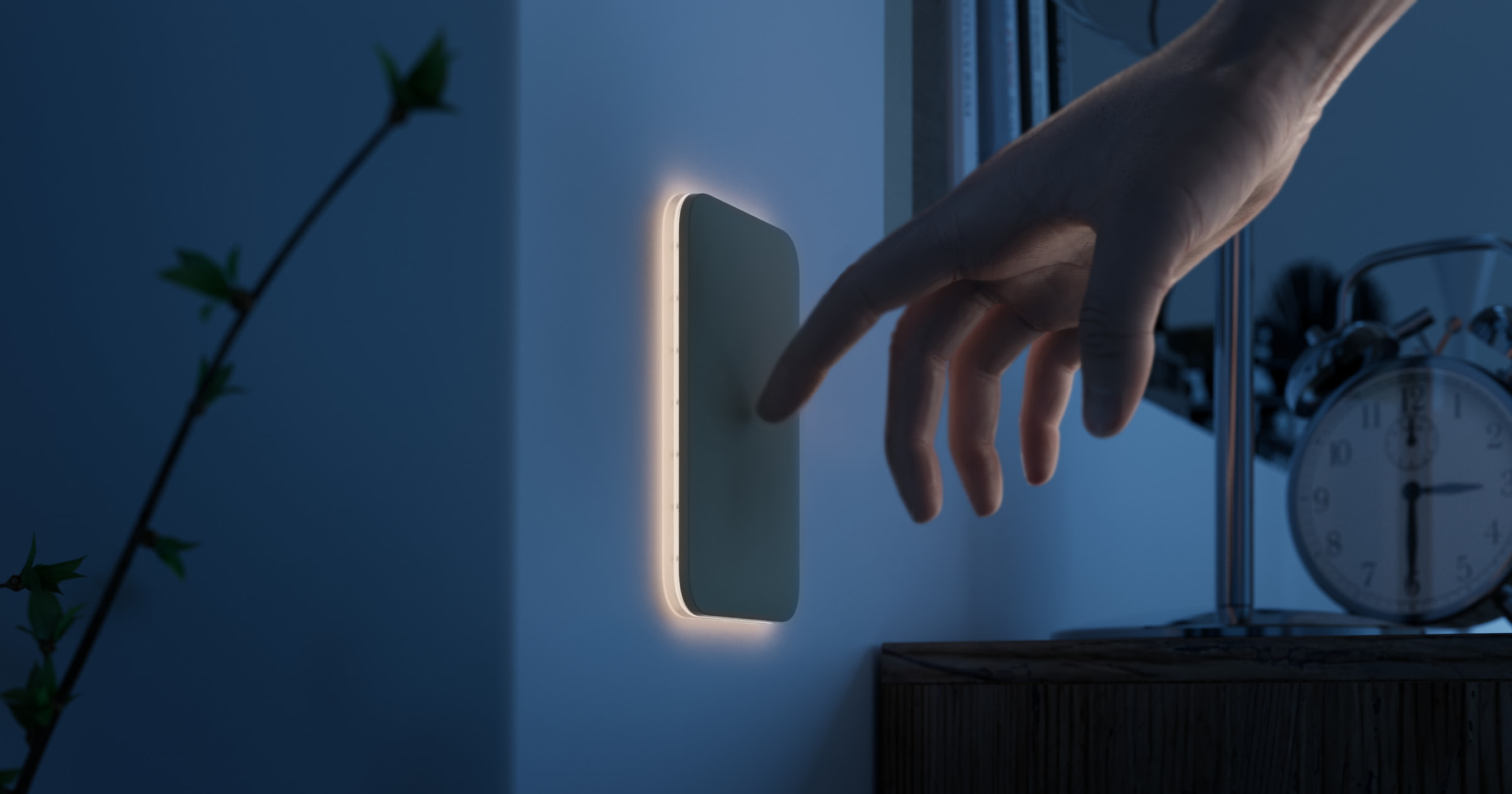
LightSwitch has a backlight that makes the switch visible in the dark. If the lighting is off, the device frame is backlit; if the lighting is on, the frame is not backlit. The backlight is not bright, so it will not disturb users even if the device is installed near a bed. The backlight can be turned off in the Ajax app if necessary.
| Indication | Event | Note |
| Flashes green every second for one minute | LightSwitch is not paired with the hub. | When LightSwitch is connected to the power supply for the first time, or when you press and hold the LightSwitch button for at least 3 seconds. |
| Flashes red every second | The temperature protection of LightSwitch has been triggered. | |
| Flashes red every second | The touch-sensitive panel is removed. |
Malfunctions
When the switch malfunction is detected (for example, there is no connection with the hub), the Ajax app displays a malfunction counter on the device icon.
All malfunctions are indicated in the switch states. Fields with malfunctions will be highlighted in red.
A malfunction is displayed if:
- Temperature protection was activated.
- A device with insufficient power is connected.
- An insufficient power supply is detected.
- There is no communication between LightSwitch and the hub (or range extender).
What to do in case of communication loss with the device
LightSwitch may lose communication with the hub for the following reasons:
- Power is no longer supplied.
- The touch-sensitive panel has been removed (it has antennas on it, which are necessary for communication with the hub or range extender).
- The lighting appliance is faulty (for example, the incandescent lamp burned out).
- A device with insufficient power is connected (e.g., up to 20 W for LED lighting appliances if a bundled capacitor is not connected).
- LightSwitch malfunction.
If an event about the loss of communication with the switch is received, the installer should check:
- Power supply of LightSwitch.
- Presence of a touch-sensitive panel on the switch.
- Operability of the lighting appliance.
If LightSwitch controls a lighting appliance with insufficient power (e.g., up to 20 W for LED lighting appliances), replace the lighting appliance with a similar one with a higher power or connect a bundled capacitor in parallel with the lighting appliance.
Maintenance
Check the functioning of the switch regularly. Clean the enclosure from dust, cobwebs, and other contaminants as they emerge. Use a soft dry cloth suitable for equipment care. Do not use substances that contain alcohol, acetone, petrol, and other active solvents to clean the device.
Technical specifications
Complete set
LightSwitch is a prefabricated smart light switch. All parts are purchased separately.
Warranty
The warranty for the products of the Limited Liability Company “Ajax Systems Manufacturing” is valid for 2 years after purchase.
If the device does not operate properly, we recommend contacting support service first, as most technical issues can be resolved remotely.
Contact Technical Support:
